#the fucking scripts and professional statements and by the bookness about it all when this is UNPRECEDENTED
Explore tagged Tumblr posts
Text
they’re interviewing some UN fuck rn talking about ‘how will the UN ensure aid if a ground operation breaches Rafah’ and he’s talking about ‘respecting civilians and international law’ and fucking ‘open communications with IDF to ensure aid gets to people in need’ like. what the fuck are you talking about. what the fuck are you TALKING ABOUT. I CANT UNDERSTAND HOW WE’RE HAVING THIS CONVERSATION WHEN WE’VE SEEN WE’VE SEEN THE AID NOT GET ANYWHERE WE’VE SEEN PEOPLE DIE FROM HUNGER AND DISEASE WE’VE SEEN PEOPLE BE UNABLE TO RECIEVE CARE WE’VE SEEN HOSPITALS HAVE NOTHING WE’VE SEEN CHILDREN DRINK RAIN WATER. WE’VE SEEN THE UN DO JACK SHIT. WE’VE SEEN INTERNATIONAL LAW DO JACK SHIT. WE’VE SEEN THE UN AND INTERNATIONAL COURTS MEAN NOTHING AND BE USELESS IN THE FACE OF THIS IMPERIALISM. WHAT THE FUCK ARE YOU TALKING ABOUT. YOURE GONNA AIR A REAL INTERVIEW ACTING LIKE THIS IS A REAL CONVERSATION YOURE GONNA STICK TO THE SCRIPT WHILE WE CAN QUITE LITERALLY S E E WHATS ACTUALLY HAPPENING WHILE WE CAN SEE THAT WHATEVER THE FUCK YOURE TALKING ABOUT HAS ABSOLUTELY NO BASIS IN REALITY. THERE HAS BEEN NO AID. THERE HAS BEEN NO INTERJECTION FROM THE UNITED NATIONS. THERE HAS BEEN NO RESPONSIBILITY TO UPHOLD INTERNATIONAL LAW. FROM THE START. FROM BEFORE THE START. AND NOW RAFAH IS BEING BOMBARDED. MORE THAN A MILLION FORCED INTO AN AREA TO GET CARPET BOMBED. THERES NOWHERE LEFT TO GO. AND YOU WANT TO HAVE A CONVERSATION ABOUT DELUSIONS. YOU WANT TO HAVE A CONVERSATION ABOUT ABSOLUTELY NOTHING.
#its been a minute since. its been this hard to stomach.#this isn’t even about this interview its about all of it. its about#the fucking scripts and professional statements and by the bookness about it all when this is UNPRECEDENTED#and you want to treat this like your garden variety ‘middle east in chaos’ 30 second news slot#free palestine#palestine#m
8 notes
·
View notes
Text
Write Like Hamilton - Tom Holland
Pairing: Tom x Author!Reader
Requested? Yes! By anon x
Hamilrequest #41
“I wrote my way out when the world turned its back on me.”
I actually really like this request! Thanks for this anon <3
P.S. there’s some truth in this one. Hint: it’s the Chris Colfer thing. Let’s just say that Y/N was based on me lmao. I’m also finding it cute that this has 1998 words hihi

Everyone has opinions about someone or something. These opinions root from an issue that went viral and spread like wildfire. Regarding the said issue, the audience may say good things or bad things. Of course those who are victims of the said issue speak out and for some reason get hate or love for it, depending on the audience. Some victims choose not to speak out and they get all the hate in the world for addressing something the audience aren’t even included in. Some victims speak out, out of nowhere and just like that, they win in the issue.
An example of that would be James Charles, who single-handedly saved his own career by releasing a video. We won’t dig deeper into that, but James really did well in that part. Of course, there were people who still hated him, but at this point, I’m sure he doesn’t care about that anymore.
Like James, you became a victim of a certain issue that sparked out of nowhere. You were a very successful author. You wrote a lot of things from short stories to novels and from poetry to children’s books. You really wanted a wide range of people reading your books and that’s why a lot of people liked you, because families can read all of your books in one household and you were proud of yourself for that.
With the money that you earned from writing, you were able to donate books to different schools around the world especially in third world countries who really needed it. You were basically an angel in the community of education.
Of course, not all people thought of that. They thought you were pretentious and that you were only doing it for publicity and money. They even had the audacity to say that you had a ghost-writer, but that was immediately debunked by your loyal readers and yourself, because you uploaded a video on your YouTube channel about the process of you writing a book.
Life went well after that. Your career was sky-rocketing and you were able to catch the attention of the world’s famous heartthrob, Tom Holland.
He tweeted you first when you were bored out of your mind and decided to take a break from writing. You thought it would be a fun idea to interact with your fans, because they deserved it after all the times they’ve supported you and backed you up. So you tweeted that you’d be doing a #AskY/N. Tom obviously had your notifications on, because he was such a fan and he got really excited when he saw that.
He wasn’t an active Twitter user and he normally wouldn’t check it, but he decided ‘fuck it, I’ll send in a question’. He wanted his question to be different from others so he asked you if you’ll be releasing a book that year.
You saw it and you were surprised that THE Spider-Man actually liked your work. You, of course, responded in a professional way: “@TomHolland1996 as a matter of fact, yes! I’ll be releasing a book this year. I’m actually working on it right now as we speak. It’s a children’s book.”
From then on, you both started talking a lot and somehow ended up dating. You’ve been dating for two years now and you loved every second of it. Both of you were really supportive in each other’s passion and career. Sometimes, he would even help you in writing a plot. In return, you would help in practicing his lines. You’d also help him and Harry with the script that they were working on.
Your life could’ve been better if it weren’t for that person on Twitter who had a lot to say about you. That person tweeted something about you stealing ideas from Chris Colfer.
Glee star. People’s Choice Award winner. Teen’s Choice Award winner. Golden Globe award winner. Screen Actors Guild Awards winner. Emmy nominated actor turned author, Chris Colfer.
The tweet went viral and most of them didn’t know how to feel. Some people didn’t know who Chris was. Some people didn’t think you were stealing ideas from him. Some people agreed with that Twitter user who started it. Some took the time to read both yours and Chris’ books that apparently had major similarities and concluded that there were none.
You didn’t know what to do. You didn’t cry, because if you were being honest, that situation wasn’t worth crying for. The people who knew the truth was you and the people around you who knew where your ideas are from. You were really hurt, because of the accusation made against you.
You saw what happened to James Charles after Tati Westbrook uploaded that ‘BYE SISTER’ video. He was destroyed. You knew that the issues that were brought up against you and James were very different, your situation wasn’t. It was very similar.
Like Tati’s video, the tweet came out of nowhere. In this situation, the Twitter user was Tati and you were James. You couldn’t imagine how James must’ve felt when his mentor did him dirty like that. You also couldn’t imagine how alone James felt when he lost everyone.
You decided that you’d address the situation once everyone has calmed down. Tom wanted to argue, because he was really mad. He wanted to defend you like the good boyfriend he was. After all, before he met you, he was a massive fan and he still was. He read all of your books so he had no problem defending you.
You told him that he didn’t have to, because you had it under control. Besides, he couldn’t defend you when he hasn’t read the books of Chris Colfer, himself. You told him that he should at least read one book from Chris Colfer before saying anything. Tom felt stupid, because he never even thought of that. You assured him that it was alright, though.
You were really thankful that, like you, Chris Colfer hasn’t said anything. He’s an unproblematic public figure and you wanted him to live his best life.
The storm like issue started to calm down and as promised, you addressed the issue. You didn’t want to write a really long thread on Twitter, because you wanted to express everything that was going on in your mind for the past week. You made a wise decision by speaking out about it on your blog. You wanted it to be short and simple yet concise and full of information. After that, you tweeted: “Here’s my take on the issue said against me. *insert link to your blog*”.
Tom was really proud of you for writing your way out of that messy situation single-handedly. The person who accused you publicly apologized on Twitter and of course, being the forgiving person that you were, you forgave them and decided that the past was in the past.
After reading your statement, Chris Colfer tweeted you and said that he knew what was going on, but he wanted to hear your side instead of other people. He thanked you for being honest and he even DMed you on Twitter, asking if you wanted to collaborate for a children’s book.
Hi! It’s Y/N and in this week’s topic, I’ll be talking about the issue that I was involved in. I’ve been writing since I was fourteen and it wasn’t until I was eighteen when I started REALLY writing books. I sold my first book ever and I was really happy it was a success.
Then it turned into a full-time job over the years and I couldn’t believe it. All my dreams were coming true all because I decided to write down my imaginations and turn it into books. I haven’t stopped since and I don’t plan on stopping which is why I wanted to clear my name.
Out of all my years in writing, this issue was the first to really drag my name down and I’m not proud of it. After all, who would be proud to have their name dragged around for something they didn’t do?
To those of you who are confused, I was recently accused of stealing ideas for children’s books from Mr. Chris Colfer. Specifically, my first children’s book. A Twitter user said that when they read my first children’s book, it was very similar to Chris Colfer’s ‘The Land of Stories: The Wishing Spell’. I haven’t had the blessing of meeting Chris Colfer yet, but we both follow each other on Twitter. You could say that we’ve became acquaintances over the years of replying to each other’s tweets and participating in every QnA one of us tweets.
I’ve known Chris for a long time more so than he’s known me. You see, I’ve been a fan of his ever since he starred in Glee. You know, the tv show about these teens in glee club and their struggles in high school. This show has been diverse ever since the beginning and it’s one of the reasons why I love it.
Chris was the reason why I wanted to write books and publish them. I was first in line when he released his first book ‘The Land of Stories: The Wishing Spell’ and it wasn’t until his third book ‘The Land of Stories: A Grimm Warning’ when I realized that I wanted to write and publish my own book. I sold my first ever book a year later and it was a success.
For those of you who really know me, you’ll know that my first book wasn’t a children’s book. My first book was a love story and it was inspired by real people and my brain just decided it would be cool to mash them all up together. Kind of like that movie Valentine’s Day.
The moment I realized that I could write a children’s book was when I babysat my niece and she asked me to tell her a bedtime story. Naturally, I picked a book from her book shelf but she told me she wanted story that was done by me. I wouldn’t tell her the story of the romance books I’ve written so, I racked my brains out to produce a story that a 6 year old could understand and like. She liked it. No, she loved it. I thought it wasn’t book worthy so after she went to sleep, I just wrote it in my drafts to include it in a short story compilation. I forgot all about it, but then a few months later, she died in a car crash. I was so heartbroken. I didn’t know what to do. I didn’t know how to grieve.
Then I remembered the story I told her, the one I made up on the spot; the one she loved. I decided that instead of crying my eyes out, I would continue writing that story. That, my friends, was how my first children’s book was born. That book was to pay homage for my 6 year old niece who would never grow up to see and feel the magic of life. That plot of that book was sincerely made on the spot and I kept making things up as I continued writing it. I’m very sure that there were no similarities from my book and Chris’ book. I know this because I’ve read ‘The Land of Stories’ a bunch of times. Maybe the magical part was the only similarity, but all kids love magic. It’s a given when you’re going to write a children’s book. Magic would be the first one to come up.
I don’t want to fight. Instead, I’ll be the bigger person. This statement is simply just addressing all the facts. I do not wish for my name or Chris’ good name to be sullied.
I’d like to end this statement by thanking Chris Colfer for inspiring me to pursue this career and Chris, if you’re reading this, I just want to tell you that I love your work and I support you and I hope we get to meet each other one day.
Thank you all for taking the time to read this.
* * * *
wow that was a long one and I loved this!! I’m really really proud of this one so I hoped y’all liked it <3
𝐓𝐎𝐌 𝐇𝐎𝐋𝐋𝐀𝐍𝐃 𝐓𝐀𝐆𝐋𝐈𝐒𝐓: @abrielleholland @peachmaybnx @superheroesaremytea @ella-whyte
𝐆𝐄𝐍𝐄𝐑𝐀𝐋 𝐓𝐀𝐆𝐋𝐈𝐒𝐓: @marvelousell @justasmisunderstoodasloki @rubberducky-jrr @petersholland @osterfieldnholland @miraclesoflove
#tom holland#tom holland imagines#tom holland imagine#tom holland one shots#tom holland one shot#tom holland x reader#tom holland x y/n#k's hamilton requests#in-a-lot-of-fandoms-tbh
17 notes
·
View notes
Video
youtube
I manifest, briefly, to write about this miniseries WHICH I HAD EXTREMELY HIGH HOPES FOR, and it disappointed me so much I’m compelled to write an actual review about it. In summary, of course. If I did it in-depth, it would probably have to be on my proper blog (oops shit I haven’t updated that in ages).
INTRO ABOUT JAPAN AND WWII (skip this to get to actual review of series)
TOKYO TRIAL. Ah. The Asian parallel to Nuremberg. Media about Japanese war crimes and the subsequent actions (the trial, the rehabilitation of criminals, the adoption of Unit 731 research by American forces, the conflicts between the Japanese Imperial Army and its victims) is not as extensive as the war in Europe. In fact, the Tokyo Trials themselves were not as punitive as the Nuremberg Trial (for a host of bureaucratic reasons, but also the lack of systematic eradication of Japanese citizens, but this is a very simplified explanation). And most media about the Japanese occupation is usually Chinese or Korean (understandably) even though the Japanese did a good job fucking up the Philippines, Malaya, the Dutch East Indies and so on. Also, much media about the Japanese occupation, I find, tends to be about the overall general existence of the Japanese occupation force, rather than specific historical figures (I am making a blanket statement here, I’ve watched limited amounts of Korean and Chinese language media on the Japanese occupation). There’s nothing wrong with this, of course, but the lack of quantity then leaves a viewer chomping on the bit for some good historical drama.
Part of it, probably, is due to the relative mystery of the Japanese occupation when compared to the Nazi occupation. Nazis, the Holocaust, the Third Reich are everywhere in media and have been researched and shared to death. Not so for the Japanese invasion (well, probably in English). The Rape of Nanking (book) was probably THE thing that shone a spotlight on Japanese atrocities, but it’s a drop in the ocean compared to the overall Japanese action in Asia (newsflash: the Japanese ALSO tortured the people in countries that were not China, even though yes, I will readily admit they especially tortured the Chinese populations in countries that were not China).
There is so much Good Shit TM from a edutainment perspective on stuff you can squeeze out of the Japanese invasion. DID YOU KNOW??? THE JAPANESE ARMY CYCLED - ON BICYCLES - FROM THE KINGDOM OF SIAM TO SINGAPORE OVER 2 MONTHS, CAPTURING ALL THE TERRITORY THEY CYCLED THROUGH (because the locals supported the Japanese invasion at the time - Asia For Asians! was the propaganda they put out which was total bullshit, the locals would eventually discover), AND THEN ACCEPTED A BRITISH SURRENDER. THE KING OF SIAM AGREED TO LET THE JAPANESE USE THEM AS THE BIKING ENTRY POINT IN EXCHANGE FOR “DON’T INVADE ME BRO” AND ALSO “can I have some northern malayan territory”. THE JAPANESE AGREED. You can’t make this shit up. And this is the non-atrocity part of it. The atrocity part is as vicious, but differently so, from the Holocaust (which I would prefer not to get into as that’s an entire essay in and of itself - summary: the Japanese bayonet everything - EVERYTHING - and also Contest to kill 100 people with actual Japanese swords as promoted by Mainichi and Nichi Nichi Shimbun and also soap water drinking stomach bulge boot step interrogation technique ok let’s stop this here)
You get what I’m saying. It’s an entire period of history that has not been harvested for good quality drama. And I don’t need fabricated romantic bullshit (I’m looking at you, Embun (even though you were damned good, you’re STILL BULLSHIT)). I’m talking Schindler’s List-type films, with history and gravitas and nuance. Most historical movies have immature script-writers who basically paint the Japanese occupiers as monsters (not necessarily inaccurate, but painfully one dimensional). (Digression: Recently I watched Kanang Anak Langkau which was about a Malayan (and then Malaysian) Ranger who helped fight off the Communists after the Japanese occupation ended and, man, the entire movie was flat... except the Communists??? Like, they were clearly terrible but they were well-portrayed and had great actors. So. Opposite problem. Asians are really bad at war films that aren’t Classic Period Dramas.)
As a citizen of a Japanese-occupied country, with YEARS of history textbooks dedicated to the Japanese occupation, and a generation of Japanese war survivors either dead or unwilling to discuss their experiences, in a region with... pretty bad recording of this sort of history, I think you get my interest and fascination with this entire chapter. And since I’m in a country that isn’t the centre of the Japanese invasion (i.e. China and Korea) it makes even more sense that I’m interested in the occupation and action in countries like the Philippines, Malaya and so on.
ACTUAL REVIEW OF TOKYO TRIAL MINI-SERIES
OK. Sorry. I had to get that off my chest. SO. Tokyo Trial.
This is actually the second piece of media about the Tokyo War Crimes Tribunal on video that I’m aware of (that’s been dramatised). The first one was a movie, also called TOKYO TRIAL, and it was a Chinese production (in English) from a Chinese perspective. The protagonist was the Chinese judge on the bench, Justice Mei. Tokyo Trial the Movie (TT(M) from here on out) was heavily dramatised and abridged in order to make for (well, attempted) excitement, action and historical legal thrills. It gets bogged down at times with some typical pacing problems (typical for Asian films). Like a good historical legal thriller, it focuses on victim testimony and the arrogance of the accused and of course it culminates in the feel good moment where you can watch outraged/distraught Japanese war criminals reacting to their sentences. Overall not a bad movie to watch, but not really great. Made interesting only by the righteousness of the protag and the severity and outrageousness of the subject matter. But it suffers from some stuttered pacing and an extremely narrow Chinese POV (understandable, given the protag and the production).
Now. Tokyo Trial (Mini-Series) (TT(MS) from here on).
Pros: Very beautiful. Decent Actors. VERY BEAUTIFUL.
Cons: Literally everything else.
HOW. HOW DO YOU CREATE A MINI-SERIES ABOUT THE JAPANESE WAR CRIMES TRIAL WITHOUT FEATURING JAPANESE WAR CRIMES?????
Astounding. I’m truly astounded. Where to even begin.
1. The protagonist
GUESS WHO IT IS. No really, guess. In a movie about the Tokyo War Crimes Tribunal, guess who the main character is. I guarantee you won’t get it.
It’s the Dutch Judge.

WHY?
The Judge, btw, doesn’t even have any kind of personal or professional link to the Japanese occupation. Even when the protag is asked by a stranded German diva about how he must have suffered during the Nazi occupation, he admits that he didn’t have it as bad as others. His family is entirely intact although they were in the Dutch East Indies when the Japanese invaded.
2. The focus of the series
can you fucking guess
it’s the goddamn judges
the entire series is about the trials and tribulations (pun fucking intended) of the GODDAMN JUDGES
DURING SERIOUS TESTIMONY OF VICTIMS AND THE ACCUSED, THE SHOTS ARE OF THE CONCERNED/CONSTIPATED FACES OF THE JUDGES
The mini-series, 4 episodes long, opens with the Dutch Judge writing to his wife and giving some decent introduction to all the major players. And then it brings into focus the various justices from around the world who will be partaking in this historical undertaking.
The President of the Tribunal is Sir William Webb, Australian. He looks great but suffers from terrible lines and staging. BTW all the characters are extremely one dimensional WITH TWO EXCEPTIONS: The British Judge (who veers between an ally, a one-note antagonist, but is then redeemed as an anti-hero - clearly the deuteragonist) and the Chinese Judge, who is soft-spoken, well-mannered, firm but not unyielding, a clear contrast to the fiery and righteous protag of TT(M). Honestly, I think he would be the best portrayal except... halfway through, Irrfan Khan appears as the Indian Judge, and honestly Paul Freeman was so good as the British (Scottish) Judge.
The entire series is about the judges politicking amongst one another and trying to argue about whether crimes of aggression (or crimes against peace) are valid grounds for a case, as these crimes have never existed before (cue arguing about the precedent set by Nuremberg).
Our intrepid (barf) protag intersperses the tense boardroom confrontations (really can barely be called that: a serious point is brought up in court, they adjourn to their chambers, they START to argue, and then the Tribunal President immediately says ok let’s all go retire for the day before any interesting or insightful conversations can begin) with one-on-one interactions with (1) a German pianist diva whom he admires as he plays violin (their duet sucks btw) (2) a Japanese intellectual who hangs out at the beach (they have zero onscreen connection and exists only to instill doubt in the Dutch judge’s mind as he contemplates the trial) (3) various judges as they begin gossiping over the latest judge to pose drama in the chambers.
That’s all. Honestly. That’s the content of the mini-series in a nutshell.
3. The pacing and the script
god it’s so
MEALY
Every scene, EVERY SCENE, is played as grave and solemn
You think this isn’t bad? Every single scene begins with thoughtful pauses and long poignant looks, even over such lines which you can picture your grandpa and uncle just quipping at each other (”The marathon begins” “I’d rather hope it would be a sprint”).
Mealy = the actual script is so awkward. It doesn’t sound like human beings talking. It’s a mouthful. ugh.
Pacing = Example: in episode 3, probably, literally 3 scenes side-by-side, 2 judges talking to each other as they walk down a path. Each scene is: A asks B about C. And then it is immediately followed by D asking C about B. CAN YOU IMAGINE??? They don’t intersperse the shot at all. It’s just 3 conversations in a row gossiping.
Pacing 2 = time passes but badly. Suddenly a year has passed, but we don’t get a sense of it unless we’re told; there’s no difference in appearance or speaking manner among the judges. there’s no real development at all, except for the position of the Dutch Judge whose position on crimes of aggression changes as he gets pulled in several ways by several people, and you end the series without any feeling of resolution or satisfaction. AT ALL. I feel like you end where you start in terms of the arguments and everything.
4. Reflections
I’ve discovered that this mini-series was nominated for an emmy in 2017 for best series. I’ve also discovered 2 reviews (ONLY) online for this series, one on a blog and on one iMBD, both praising the series for being good for history buffs that showcases an unknown part of history.
i) That is not accurate. It is a terrible series that showcases the politics and drama of the tribunal judges, and not of the japanese war crimes. literally nobody needs to know, or care, about the judges of a war crimes trial (british, canadian, US, NZ judge conspire to get the president replaced, he leaves, US judge is chosen as his replacement, HE COMES BACK, NOBODY CARES) (aside with Blakely the US lawyer and what he’s trying to accomplish in court with his controversial and it’s not explained and ignored later)
ii) Historic footage is interspersed, meaninglessly. This includes the footage of the accused and 2 victims giving testimony, I believe. It is THE MOST INTERESTING part of the series. The footage used is minimal. And it just doesn’t gel with the whole series as a whole.
iii) This show was made by a Japanese crew and NHK so.
All in all, from an entertainment perspective, Tokyo Trial failed to be compelling, interesting or noteworthy. The actors were bogged down by a bad script and weak direction. If you want to watch a show about the Tokyo War Crimes Tribunal, watch the older Chinese movie - less accurate but way more entertaining, and it ACTUALLY focuses on Japanese war crimes.
17 notes
·
View notes
Note
I used to be so sure of Jonsa but I was shook by the face Hanna Murray pulled when she was asked about it. And I don't find it likely that she doesn't know the ending or is that she is that good at improv.
Dear nonny,I would not give too much attention to actors’ interviews or reactions tbh. It can be fun to speculate of course, when Nikolai for example says that he is very satisfied with the ending, when Maisie says that she would never have guessed the ending, when Emilia says the last Da€nerys scene fucked her up. But we have to remember a) the actors are forbidden to give away anything b) they are probably told to tease the show - And they do that on a vague way with (It’s great, mind-blowing etc.) c) these are people who earn their living by acting…..If I were an actress and I were on a very popular show I would prepare for the (maybe remote) possibility that someone asks a question that hits close to the truth and choose something that would discourage people asking further. It may even be that not all the actors are familiar with the ending. So, if I were an actress I would feign surprise at the theory, if in addition I do not like the ship I would react slightly grossed (might look more natural) and then I would proceed to talk about something that is exciting, is sure to hype the audience etc. Let’s be honest : That’s Sansa and Tyrion will have scenes is no surprise. That it is a possible ship is not a surprise either. Tyrion on the show is much different and showwise I wouldn’t even mind Sanrion. It’s just that I can’t see it in the books with the very dark turn Tyrion’s arc has gone.So, the best thing is to not read anything out of the interviews the professionals involved with the show say. If you think about it they tend not to reveal anything of importance, in fact they veil important developments. They pretend to give us crumbs but I reality they give nothing, if you look closely.Of course we may speculate about some interviews like when Kit said that Jon has become a manipulator, but I would be careful to argue with that. To anybody who backs their arguments with actors’ statements (alone) I would answer that Maisie told everyone after receiving the scripts for season 7 that this season was the greatest yet.. And what did we get? Winterhell plot and Wight Hunt….These people are paid for pretending and acting. It’s in their contract to hype the show and hold close to the secrets of the show. And this is what they do. Steel yourself for more Jon€rys teasing and just ignore. I’ve even seen ‘Starkbowl’ rise it’s head again. I would be worried if people involved with the show would tease Jonsa tbh.Thanks for the ask!
#anon ask#Jonsa#i don't trust anything the actors say#got actors' interviews#Hannah Murray pulling a face means nothing
24 notes
·
View notes
Text
DiC Dub vs Sub Ep 17/21 “An Animated Mess”/”Protect Children’s Dreams! Friendship Linked by Anime”
Aaand I’m back! Heads up, this is a super long post because there’s also a Zoisite-Syntax essay in here too!
So to recap (because I’m not necessarily doing these in order, some are just more meatier and funner to get to than others): In the last episode, the Zoy/Zois have tried to get Nef/Neph in some serious trouble, and it backfired. +1 for Nef/ph.
So in this episode, it seems like their rivalry has stepped back in intensity a bit. Zoy/Zoi appear to be more chilled and less heckly, and Nef/ph seems to be either riding on the confidence of showing Zoy/i up in the face from the last episode, or otherwise doesn’t care. It sets up a really nice scene, actually, because it’s refreshing to see these two villains in a civil-ish behind-the-scenes interaction once in a while.
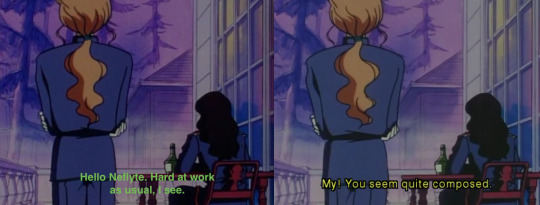
Zoy/i enter. I know there’s no audio, but I love Zoisite’s “Ara!” when he says “My!” Like, I can’t get over how like, very high-society-gossip his voice is. “My!”
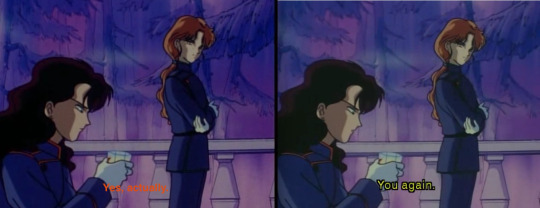
Interesting how once again, they changed the script so Neflyte appears more sympathetic. By saying “Yes actually,” it makes Zoycite appear more like the heckler. In the original Sub, Nephrite responds with “kisamaka” - a disdainful, dismissive “hmph, you again?” sort of meaning. Like, I can’t iterate how much I get the impression Nephrite finds Zoisite more annoying than Neflyte finds Zoycite, even though Zoisite is honestly not even as intrusive as Zoycite is.
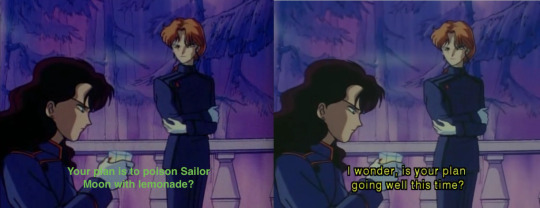
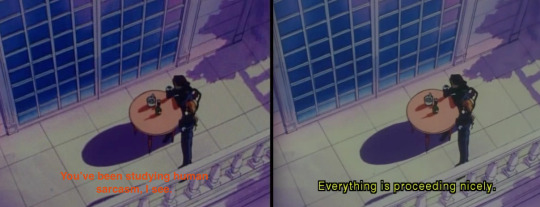
Okay, what’s interesting in the Sub here, there actually is no sarcasm or sniping back-and-forth (unlike the Dub). This legitimately seems like a civil conversation. Like there’s no background music, no evil theme song. It can almost be seen as two colleagues checking in on each other. Almost. My take is that Zoisite’s temporarily laying down arms a bit to recalibrate how he’s going to approach the rest of their dynamic in the future. And Nephrite’s letting him because he’s still riding on the confidence from one-upping Zoisite from the last episode...and also because he really doesn’t think Zoisite’s much of a threat.
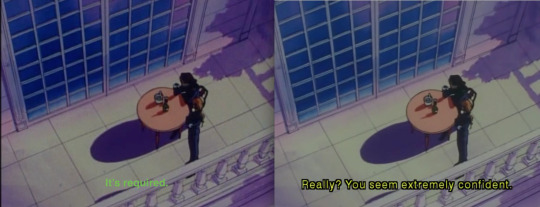
Ahh, infamous dub words.
That aside, I feel like the subtitles don’t really capture the softness and coyness in which Zoisite’s saying these words. Like, when we read them in English, they seem really straightforward and almost...ballsy? Whereas the impression I got when I was listening was more like “Oh? Well, don’t you seem extremely confident.”
Which would make more sense when you consider his next line:
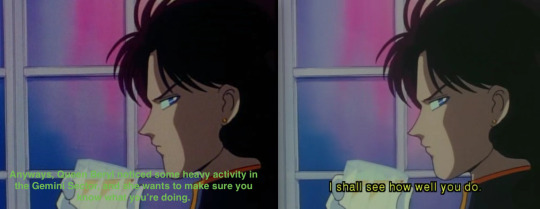
Ok, this is one screenshot in which I definitely would have translated differently.
As usual, Zoycite comes off as more domineering and over-lordy. She’s practically trying to assert herself as Neflyte’s supervisor on behalf of Queen Beryl. When you read Zoisite’s subtitles, you might assume the same thing, because his statement seems super pretentious in English. “I shall see how well you do”? Who the fuck is he to assume such power? If we were take the English subtitle as is, we’d probably assume he is acting on behalf of some other power (Beryl or Kunzite, your pick).
Except, I don’t agree with how this line was translated. It’s very likely I’m misunderstanding some social context with this line (since I’m translating nearly word-by-word) or how it’s used, but, the way I interpret it is very different.
So in this scene, what Zoisite actually says is:
お手並み拝見させていただくわ
otenami haiken sasete itadakuwa.
So otenami haiken means “Let’s see what you got” or “Let’s see your skill in this match” kind of thing. You’d say it to your opponent in a game, or in a drinking match. It’s kind of sarcastic, like how you would expect in English. By using this term, Zoisite is actually referring a match - a literal match, their rivalry. He isn’t checking in on behalf of Beryl, or supervising Nephrite. He is literally saying We’re both playing this game and now it’s your turn: why don’t we let’s see what you’ve got.
The second thing I’m picking up on (that the subtitles can’t) is how Zoisite conjugates the rest of his sentence. Most importantly, his use of the words sasete itadaku, which is an example of keigo speech: super polite speech that you would use for business, colleagues, clients or anyone on higher on the hierarchal ladder than you. It’s also like, super ...humble? Like it basically would read like this:
(Please allow me to) see what you’ve got.
Except Zoisite’s not...actually meaning it? He’s not really asking for Nephrite’s permission. The type of language he’s using is more like he’s ostensibly asking permission Nephrite to let him watch. It’s like, Zoisite being super polite and passive-aggressive all at once.
The irony, is, though, that Zoisite isn’t entirely outright being sarcastic. At least, I don’t think he is. Why? I mean, he’s in private, he’s not in front of Beryl, and we all know he doesn’t like Nephrite - so really, he doesn’t have to be polite to Nephrite. And of all the Shitennou, does anyone think Nephrite would give a fuck about the proper way one should be speaking to someone on the hierarchal ladder? Fuck no! This is the guy who can hardly keep it together professionally even with Beryl seething at him from the opposite side of the crystal ball. So why does Zoisite do this?
I think, the poor boy can’t help it.
I think Zoistie’s mannerisms - his feminine speech, his polite airs, his professionalism and his by-the-book manners - I think all of this is just him. It’s intrinsic in him, and his best strength: It’s his only way of playing the game: appearing to keep by the rules, keeping his nose clean, looking like a team player and just overall an impeccable fellow, while hiding his true capabilities and ruthlessness inside. This is how he’s even described in official merchandise books: “deceptively gentle, like a fanged beast ready to strike.”
And yet, ironically, this is probably what drives Nephrite bonkers. Since Nephrite is the kind of guy who speaks exactly what he thinks and puts no air or fake graces, Zoisite’s behaviour is exactly the kind he would detest. He can see how fake Zoisite is behind his “civilized” manners (see how Zoisite, in later episodes, likes to differentiate himself from other “barbarian” youmas), and probably finds him weak and spineless by doing so (not to mention pairing with Kunzite). Essentially, this is where I often get my Neph/Zoi Older-Brother-Younger-Brother headcanon from: Zoisite is that pesky younger brother trying to compete with the rest of them, and Nephrite is up to here with babysitting. He’d probably have more respect for Zoisite if he just grew up. But, Nephrite’s ego also thinks Zoisite is nothing more than that: just a silly little brother, trying to pretend he’s big enough to play with the big boys...and thus, he lets him in to watch how it’s done, without really considering the consequences.
OMG that was super long. Let’s continue on with the rest of the episode. I swear I’ll be fast.
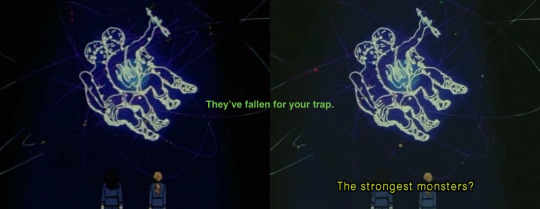
(Please excuse my error in screencapping) But look! Zoisite is practically “learning”.
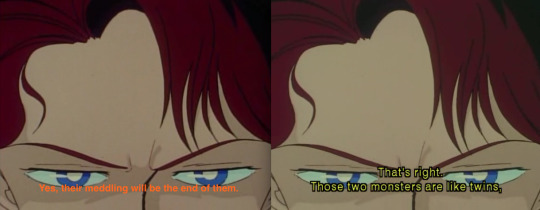
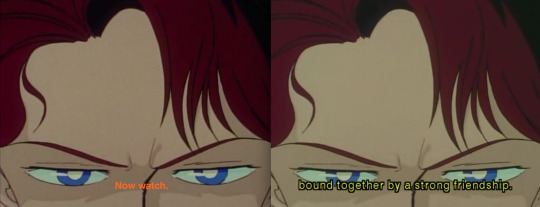
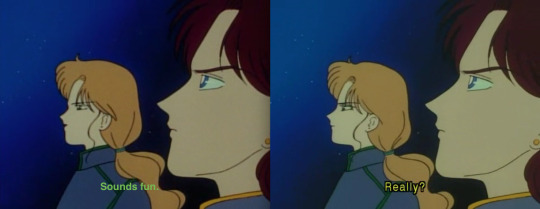
Note how Zoycite is still approaching this as if she expects Neflyte to fail, and is waiting for it. She might as well be eating popcorn. Zoisite, on the other hand, remains coyishly neutral. I think he’s using this time to really get a sense of what Nephrite is made of.
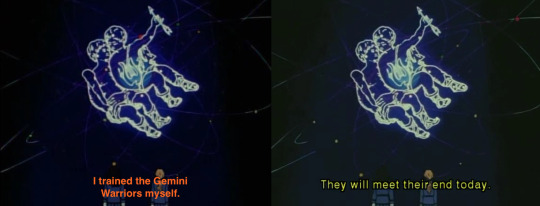
I think I’m beginning to understand what Naoko meant when she said that Nephrite had the biggest “elder brother” type of ego. He seems very sure of himself like all the damn time, even when his track record isn’t the best.
And when it blows up in his face...
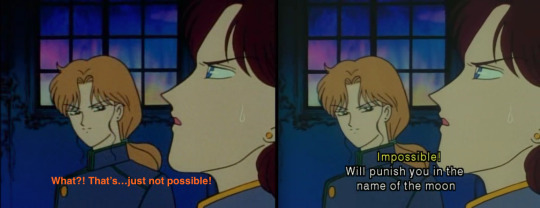
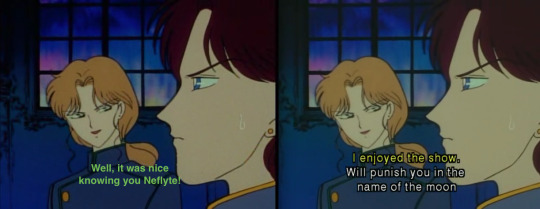
Zoycite, classy as always. (<--That’s me being sarcastic)
Zoisite, definitely classier, but HOHO. Like, the subtitles are totally correct, but I feel like in English, a combination of his polite+sarcasm would sound more like “Thanks for the show :)”.
So tldr, while Zoycite is nailing human sarcasm, can we talk about the aristocratic-level of sarcasm we’re getting from Zoisite here? God I want to see this boy sass over a cup of tea.
#DiC dub#zoisite syntax#shitennou syntax#shitennou syntax analysis#dub vs. sub#DiC Dub vs Sub Commentary Watch#episode comparison#character analysis#DiC Dub commentary#theories#neflyte#nephrite#zoycite#zoisite#sailor moon classic#long post#headcanons
65 notes
·
View notes
Text
MTVS Epic Rewatch #178
VM 3x11 Poughkeepsie, Tramps and Thieves
Stray thoughts
1) Okay, all the cuteness and fluff in this opening scene should’ve been a warning sign that this episode wasn’t going to end on a happy note for LoVe, right? I mean, tell me this doesn’t read as a piece of fanfic.
VERONICA: Are you gonna eat that? LOGAN: This? VERONICA: Yeah, that fry in particular. LOGAN: That was the plan. VERONICA: I'm just saying, if you weren't, or if you were just gonna consume it out of obligation or to meet someone else's expectations, I know someone who might be willing to take it off your hands. VERONICA: Maybe add a little ketchup, make it worth a girl's while.
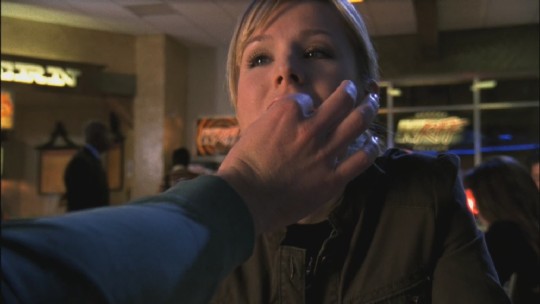
VERONICA: You're welcome.
Of course, I’ve embraced the notion that Rob Thomas is actually writing LoVe fanfiction a long time ago.
2) Ugh, Weevil’s so sad about the Dean’s death. Of course, he is! How many people have actually given a rat’s ass about Weevil? Not that many, and the Dean was one of them.
3) So, Lamb is more of an idiot than I thought. I mean, this is how responds to Keith’s burn…
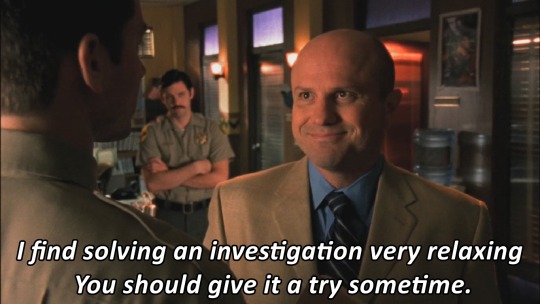
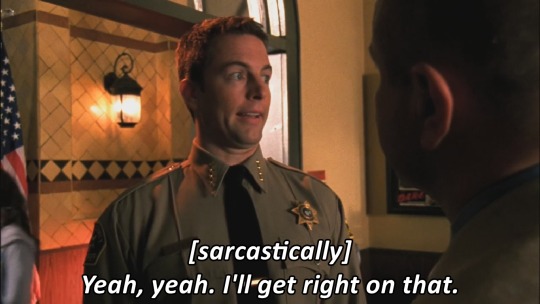

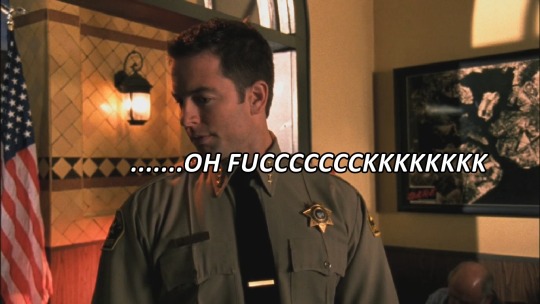
He doesn’t understand his own sarcastic comment is actually a self-burn? Like, you can actually read his lips (“Oh, fuck”) when he realizes what he just said?
4) “ You're just like the rest of them, aren't you? You just want to use me for my skills and pay me for my time and effort.”
5)
MAX: If you don't find her, I'm taking a bath with my blow-dryer.

6) This is one of Veronica’s traits that always rubs me the wrong way, probably because people mocking others’ interests is a personal pet peeve of mine…
MAX: It was Comic-Con. VERONICA: You didn't get all sweaty in your Wookiee suit, did you? MAX: Yuk it up. You know, it's not all Trekkies and Star Wars nerds. I was there because Dave Gibbons has a new graphic novel that he scripted as well as drew. VERONICA: [sarcastically] Sounds cooler now.
Get off your high horse, Veronica. There’s nothing uncool about liking stuff. That mentality sucks.
What’s worse, she’s clearly a closet nerd, since she can both deliver and understand geeky references.
7) Now, this is the Veronica I love...
MAX: Have a seat.
VERONICA: No, thanks. It's easier to be nosy if I can mill about.
8) And I love this little Easter egg...
VERONICA: You know Mac and Parker? This is their room.
MAX: Who?
VERONICA: Uh, this photo.
MAX: No, that's from the around-the-world party. That's my roommate, Brian, and my friend, Fred. I think that room was supposed to be Canada, but it was kind of lame.
9) This is gross on so many levels…
VERONICA: The glass-is-half-full version: Chelsea's not getting married. Max is overjoyed. MAX: Are you serious? VERONICA: Yeah. The half-empty version is...she's a hooker. VERONICA: Brian and Fred, as demented as this sounds, thought you'd have more confidence with girls if you...lost your virginity.
10) And this is something the show did a lot during this season, and I honestly appreciate it:
MAX: Can you still find her?
VERONICA: Um...yes. But she'll still be a prostitute.
MAX: I'm not stupid, Veronica. Okay, we had something. I know it. There's some things you can't fake.
VERONICA: There are some things women are universally known for faking, and this girl is a professional.
MAX: When I dropped her off at the airport, she had tears in her eyes.
VERONICA: Are you sure she wasn't thinking of the cab fare back?
See, Veronica’s fieldwork in the world of P.I. has given her hands-on experience on how seedy and corrupted everyone is. Expecting the worse and jumping to conclusions has become second nature to her. She can’t help it. It doesn’t help that more often than not, her instincts are right. But on occasion, people surprise her and prove her wrong. This will be one of those cases, at least in the sense that Wendy really had feelings for Max. And every time Veronica is proven wrong in her preconceptions, it feels so refreshing because Veronica is judgmental and jaded to a fault. And like Logan told her a few episodes ago, she’s not always right. She still believes she is, though.
It still kind of feels this pattern of Veronica having preconceptions and then being proven wrong was building up to something bigger, you know? Veronica had become more prejudiced and prone to snap judgments at the same time she became more reckless and cocky with her detective work. As the season progresses, her sense of infallibility and almightiness gets stronger. But she is never forced to face the music. I think it would’ve been a great arc if she was.
11) See point 6) above.
VERONICA: That explains why Chelsea was into comic books. Chelsea's a dude.
12)
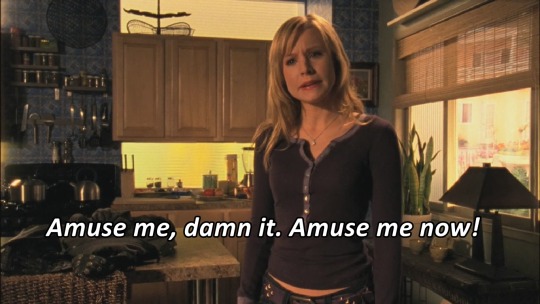

13)
KEITH: Will you be home for dinner?
VERONICA: No, I'm meeting two hookers over at Logan's later.
KEITH: On a school night?
VERONICA: Off-peak hours. Save a few bucks.
KEITH: You're not really.
VERONICA: Fiona and Lizette. They're just a couple of gals putting themselves through college. Man, quit bringing me down with your bourgeois hang-ups.
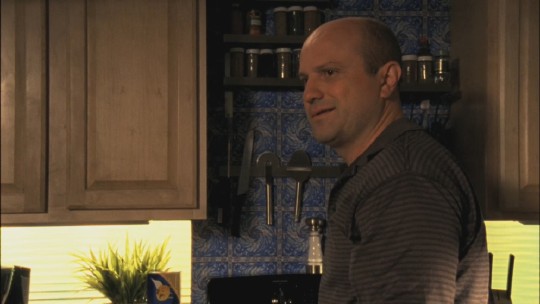
14) This conversation pretty much sums up Logan’s and Veronica’s issues and insecurities as well as their relationship’s shortcomings in this season.
VERONICA: So, have you...ever been with one? LOGAN: An escort? VERONICA: Yeah. LOGAN: Do we really want to go there? VERONICA: I guess we don't have to now. LOGAN: Come on, that wasn't me answering the question. VERONICA: It kinda was. LOGAN: No, it wasn't. That was me knowing there's a land mine and trying to figure out where to put my foot. VERONICA: Well, I guess you picked your spot. Look, why not dispel any romantic notions? If we see each other, warts and all, and still like each other, that's a real connection. LOGAN: Well, maybe I enjoy my romantic notions. Maybe I don't care to see any warts, you know, yours or mine. Now you see, you're smiling, all right, so I think it's all fun and safe, but it's a slippery slope from "Have you ever been" to "How many" and "How often." VERONICA: So you've been with multiple hookers on several occasions. LOGAN: I'm not having this conversation with you.
On the one hand, Veronica claims she wants to know about Logan’s sexual exploits so that they can disregard any “romantic notions” they might have about each other and love each other as they truly are. On paper, that seems like a solid statement. And I’d buy it if she wasn’t prying on Logan’s sexual exploits, to begin with. Veronica has always been terrified of Logan cheating on her, with has more to do with her own insecurities than him giving her actual reasons to suspect him. Other than the one time he “cheated” on Lilly with Yolanda (and I think it’s fair to quote Ross Geller’s “we were on a break” defense,) Logan’s always been faithful. Yes, he does sleep around when he’s single, but when he’s in a relationship with someone he loves? I think Logan would cut his own dick before cheating. Veronica knows this. She’s had first-hand experience on how loyal and faithful Logan can be. And she had a first-row seat to Logan and Lilly’s relationship – he was the cheatee, not the cheater. So the fact that she wants to dig in Logan’s previous sexual relationships has to do with her own insecurities as regards how she won’t measure up to Logan’s former sexual partners. She probably feels inexperienced and inadequate. She might even think he could get bored of having sex with her (I know, she’s delusional! Logan could never get tired of her! NEVER!) And so she’s been restlessly waiting for the other shoe to drop and for Logan to cheat on her pretty much since they started dating.
On the other hand, there’s Logan claim that he’d rather avoid this conversation because it is quite literally a landmine. He’s honest, of course. And right. Nothing he could ever say would satisfy Veronica. And that’s the problem. That’s his own insecurity when it comes to her. But the difference is, his insecurities are well-founded. We already got a glimpse of this when the whole Mercer-and-the-hotel-on-fire thing came up. What frightens Logan more than anything is that he believes he will never be good enough for Veronica. And Veronica, more often than not, makes him feel wanting. So, you see, fessing up about his sleazy past won’t exactly paint him in a boyfriend-material light. Logan’s smarter than that. Moreover, he knows he’ll probably feed Veronica’s mistrust because for some reason she has this internalized misconception that if you are a sexual being, then you’re prone to cheating.
15)
VERONICA: Sorry, Lizette. Looks like we're gonna have to reschedule. Pay the girl, Max.
LOGAN: If we're paying her anyway...
VERONICA: Honey?
16) Look at this goofus face when the two lovers are finally reunited! You truly believe this guy could cheat?
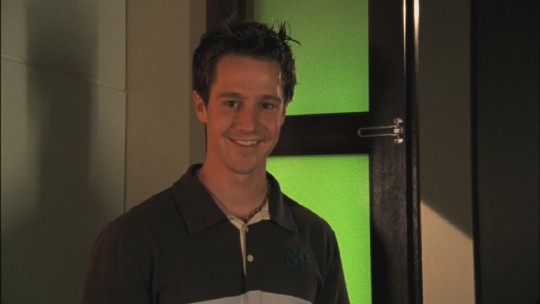
17) Ugh, and then…
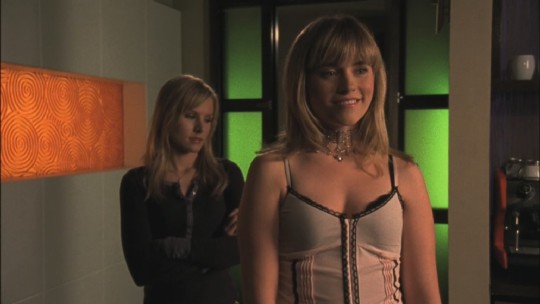
To Logan’s credit, he didn’t even bat an eye when she showed up. But then…
VERONICA: No, Madison is pretty much the physical embodiment of all things I loathe. If Dick starts dating her again, you're gonna need to get a different roommate.

He can’t look her in the eye because he knows, he knows what her reaction is going to be once she finds out he slept with Madison (even if they weren’t together when he did…)
18) I fucking love this moment…
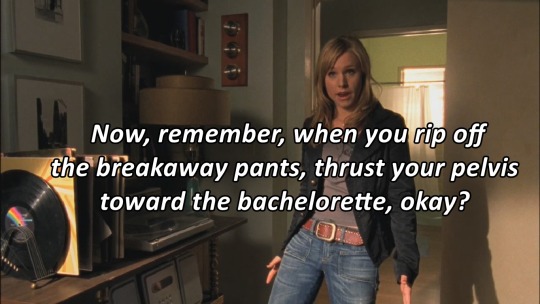
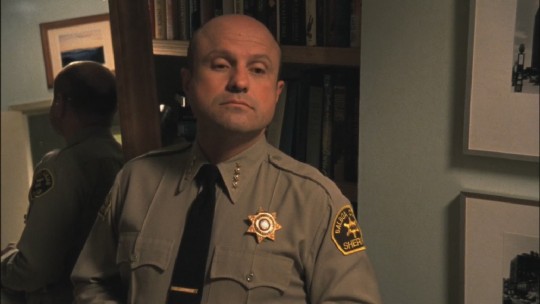
The way Keith just looks at her like actually taking note of her advice? It kills me.
19) Favorite!


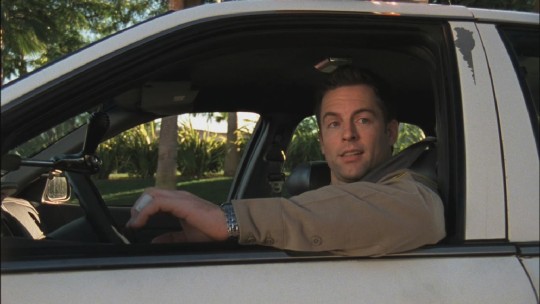

20)
WENDY: Oh, my God. Thank you. That's the thing about being a working girl. Easy to break into, not so easy to get out of. It's not like I'm one of the big earners, but I have this client, a judge. VERONICA: Ooh, a judge? Which one? WENDY: Cramer. VERONICA: No freaking way! My dad busted him for taking bribes, and the old bastard still got re-elected. WENDY: He is the kinkiest out of all my clients. No sex, he just likes to sneak me into his office at the courthouse. All he wants to do is have tickle fights and walk around in my shoes.
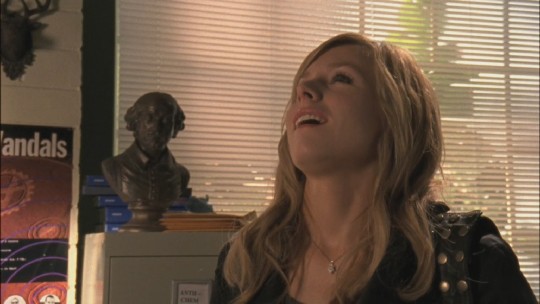
And while Veronica is delighted with this piece of information, Max is…

…the opposite of delighted?
21) “For what little it's worth, I was totally wrong. You and Wendy do have something. You two are great together, and I'm sorry. And this just plain sucks.” You see? How nice is it to hear Veronica admitting she wasn’t right?
But, of course, literally one minute later…
VERONICA: It's purple makeup. The bruise was a fake. You've been had. They duped you. Nicki didn't get worked over by her pimp. She and Wendy just conned you out of a grand. MAX: That's crazy. VERONICA: Crazy? She screws people for money, Max. That's what she does. VERONICA: I'm sorry. That wasn't- MAX: No, I'm an idiot. VERONICA: You're not. From where I stand, Wendy's the idiot. And now we must crush her.
No evidence other than the stained cloth and yet she thinks she’s figured it all out. And she’s ready for payback. Ugh, I wish they would’ve gone somewhere with this pattern of behavior!
22) You see what I mean?!
LOGAN: This is a bad idea.
VERONICA: It's blackmail. It's the go-to idea. In case of emergency, break glass or blackmail.
LOGAN: Uh, excuse me if I can't get jazzed about my girlfriend extorting a judge.
VERONICA: Look, I'm not doing a back handspring about it either, but I'm getting Max his thousand dollars back, and I'm taking away Wendy's best client. It works on so many levels.
MAX: You don't have to do this.
Like, even Max tells her she doesn’t have to do this. And she ploughes ahead
23) And, let’s be honest, she gets off on it…
VERONICA: I can't believe I had to blackmail a judge just to get some alone time with you.

24)
VERONICA: But seriously, folks... have you? LOGAN: What? Ever been with a hooker? Why does it matter? VERONICA: I just want to know. I assume the answer is yes. Look at it as an opportunity for me to show you how cool I can be. "Hooker? Who cares?" LOGAN: Well, here's your chance to be cool. Stop asking. VERONICA: I just want to get to a place with you where we can be really... intimate. LOGAN: That's what the female praying mantis says before she bites the male's head off. VERONICA: I'm just saying, buried secrets tend to surface when I'm around. LOGAN: Maybe that's because of all the digging, huh? VERONICA: I'm giving you the chance right now to come clean. You tell all. I tell all. Go from there. LOGAN: Hm, fine. Ask away. Ask anything you want. VERONICA: Have you ever been with a hooker? LOGAN: No.
She’s giving him a chance to “come clean” as if he’s committed some sort of crime. And she can’t help her smile when he confesses he’s never been with a prostitute.

25) So was he talking about the beach girl or Madison? Or, possibly, both.
VERONICA: Were you with anyone while we were broken up? LOGAN: Landmine. I fooled around with this horrible girl who meant less than nothing to me, and I couldn't regret it more. Thinking of it makes me ill. So, there. Presto. Intimacy. Still love me? VERONICA: Yes.
26) You see Veronica? You’re not invincible…

27)
VERONICA: You just handed over a hundred hundred dollar bills.
MAX: Yeah, I was there.
VERONICA: And what guarantee do you have that-
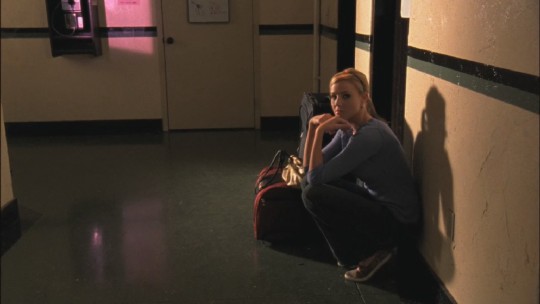
28) To be honest, I love how Weevil treats Wendy in this scene. Like, no judgment at all! He’s just happy to see someone he knows and wants to say hello! You’re cool beans, Weevs.
WEEVIL: Hey, I-I know you.
VERONICA: Weevil, this is Wendy.
WEEVIL: Fiona, right?
WEEVIL: You used to dance at the Electric Lady. My buddy was a bouncer up there.
WENDY: You must be thinking of someone else.
WEEVIL: No, I don't think so. You have a tattoo, red dragon, left cheek. Am I right?
29) Okay, so that lasted as long as a un pedo en una canasta. (sorry, I like this idiomatic expression in Spanish and I’m not even trying to translate it.)
MAX: "The-the day we met was one of the best days of my life. I-I fell for you that day, but you didn't know what I was then, and now you do and it shows in the way you look at me. It shows in the way you touch me but I'll never regret it. You made me realise what I was missing. Love, Wendy."
30) UGH UGH UGH…
MADISON: Oh, Logan and I hooked up in Aspen over the holidays. I guess you two were split, huh? I was in town and thought he might have some free time, but, oh, well. Oh, and, as a friend, he's not so big on the one-piece numbers.
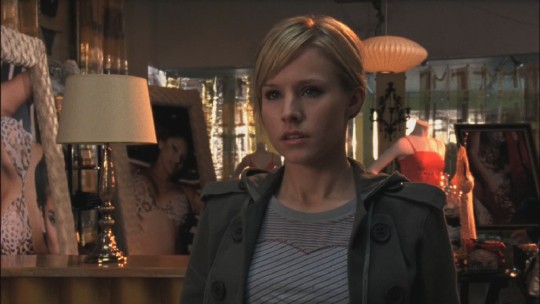
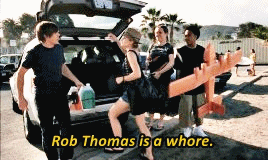
#Veronica Mars#VM#Kristen Bell#Logan Echolls#Rob Thomas#LoVe#Poughkeepsie Tramps and Thieves#MTVSepicrewatch#VMrewatch2015#mine#recap#vmrecap
39 notes
·
View notes
Text
Together: chapter 7
I’m not going crazy. Youngbin tried to convince himself when one of the boys pointed out he was leaving the apartment with no pants on. Face flushing red and at least half a dozen new curses to his book, he put on some pants and went out.
Time was running out and he had yet to finish the choreography, lucky for him he had Chani and some of the girls to help him. Entering the practice room he took a glance at the mirror, convinced that he had picked the worst pants to put on. I need to calm down. He sat on the floor, face buried on his hands, trying to figure out what kind of fucked up sense of humor the universe had to be doing that to him.
- Is everything okay? - Eva’s voice echoed through the room. His senses started tingling. The concern on her voice was more than obvious and that annoyed him a lot. Not that he didn’t want her to care about him, he just didn’t want her to spend her time worrying about him.
- Yes. - he grumbled lifting his head.
- You can talk to me. - God damn it, Eva. She always dropped the subject, why she was suddenly insisting on it? Just let it go.
- I’m fine, Eva. - the tone in his voice wasn’t exactly reassuring, but more of a warning.
- Maybe I can help you… - Jesus Christ, woman!
- Eva! I told you I’m fine! There’s nothing wrong! - he snapped louder than he planed.
Already expecting her to snap back at him, he did not even turn his head to look at her. But silence filled the air instead, she placed a cup of coffee next to him and left the room. Oh God. The rapper knew he had screwed up. Eva was usually someone to fight back and he would rather that she had yelled back at him, called out on his saltiness. At least he could be pissed about that and the tension between them would fade away. The silent treatment, the whole “I’m not mad, I’m just disappointed” was worse than everything. Taking a glance in the mirror he cursed himself. Idiot. At least this scene wasn’t being recorded, he thanked silently for that.
Needless to say, he tried the best to remain focused but it didn’t leave his mind the whole practice. Guilt had taken over him and he couldn’t wait for the day to be over and run back to her apologizing. Everyone was shooting him worried looks, but he barely acknowledged it.
When practice was finally over, he quickly dismissed his group. Almost – because he still had some self respect – ran to Eva’s practice room, almost face planting on the floor when he jerked open the door – managing to get his balance at the last second – and almost screaming at the scene he saw.
Eva and Taeyang were hugging. And for some reason it pissed him off. The annoyance he felt earlier came back kicking him in the guts even worse. Everyone in the room seemed cheerful, not slightly weirded out by the clear display of affection between them. Was this a common thing? Did they often hug each other? Was he missing something here? He heard his heart beat on his ears.
- Do you need anything? - Eva asked, making he realise he had been staring at them. His face warmed.
- Uh…- why was he there anyway? Oh. - Can I talk to you? - weird feelings were taking over his body.
- Okay. - she sighed - Alright everyone, see you all tomorrow!
The whole point of asking her to talk to him was to apologize, but damn. Why was she hugging Taeyang? For a moment his mind wondered what it would feel like to hug her. Please get your shit together. He mentally scolded himself. Why was he thinking about it anyway? It had nothing to do with him and he had no right – or reasonable excuses – to be pissed about it.
- What do you want to talk to me? - she woke him up from his trance causing his heart to race when he realised they were face to face.
- Uh… I… - as much as every reasonable part of him screamed for him to apologize, he couldn’t take the image of her hugging his maknae off his head - What’s going on between you and Taeyang?
- What? - she lifted her eyebrows. Oh God, there was no comeback now
- Is there something between you? - even though he regretted asking it he still wanted to know.
- Is that what you wanted to talked to me about? - she frowned at him.
- No, but… - he hesitated as he tried to find acceptable excuses to that.
- But what?
- You’re our coach, he should be focused on training. - wasn’t the best excuse, but it was acceptable, wasn’t it?
Eva stared at him like she was two steps away from committing a murder causing Youngbin’s insides to twist in a storm of feelings.
- I’m your coach, not your priest, and he’s old enough to know what’s good for him. - she barked turning around to leave.
-
Laying on his back, SF9’s leader stared at the ceiling with so much intensity it might as well have burned holes in it. Jaeyoon sighed loudly getting his attention, the younger boy looked at him with his eyebrows lifted.
- What? - Youngbin asked.
- Really? Do I have to say it? - he crossed his arms.
- What are you talking about? - he swallowed.
- I heard you and Eva arguing… is that why you’re like this?
- What? No. - he shrugged feeling his heart flutter at the mention of her name. Jaeyoon arched an eyebrow at him unconvinced - Okay, yes…
The other boy sat on his bed as a way to encourage him to go on.
- I kind of snapped at her before practice, but instead of apologizing when we were talking I… - he realised how ridiculous it sounded before saying it.
- You what?
- I… - he could see the annoyance in Jaeyoon’s face, he would judge him so hard - I asked her with she had anything with Taeyang…
- You what?! - he gasped furrowing his brows - What the… why would you…
- I know, I know… - he regretted it already, especially saying that to Jaeyoon, he would make such a big deal of it.
- Why would you even worry about that? - he questioned after getting his thoughts together.
- I don’t know… I saw them hugging when I came in so I thought…
- Are you serious? - he laughed - We had just finished the whole choreography and we were celebrating.
Youngbin felt dumb now for worrying so much about it. But still, isn’t it just a little bit weird that they would celebrate hugging?
- And we all know Taeyang has a silly crush on her… - he shrugged, but that made him feel even more uneasy -… but she keeps it professional always, you don’t have to worry.
- She does? - he babbled.
- Yes… and you should apologize to her. - he patted the other’s shoulder getting up.
Even though he was relieved there was nothing going on between them, two things concerned him now. Taeyang had a crush a her. She kept it professional. “I’m your coach, not your priest”. Why was he even thinking about it anyway? He had to apologize, that was the only thing he should be worried about now.
-
Losing the last drop of respect Youngbin had for himself he stood up from one of the kitchen’s chairs. He had been staring for the clock on his phone for the last 23 minutes waiting for a non suspicious time to leave the dorm to practice, but he just couldn’t wait anymore. Praying she would already be there rehearsing he left the apartment.
Of course life had better plans. The studio was empty, he sat on the practice room’s floor replaying on his mind the apologies he had prepared, knowing every line by heart. But as soon as the door opened his mind went blank, getting up so fast he almost tripped on his own feet. Eva stared at him holding the door, slowing stepping in the room she placed her things some where on the floor. Youngbin couldn’t help but notice the way her back arched, legs flexed and… God damn it! He wanted to scream at himself, but kept quiet for the sake of appearances. Gazing at him with her lips slightly parted she waited for him to say something.
- I’m sorry. - seriously? After planing a whole script of apology worthy of an Oscar and rehearsing it in his mind for the past two hours, that was all he had to say?
Eva just stared at him for a few seconds and to his confusion she didn’t look angry as he expected. Not at all. Not at least pissed. The rapper’s heart quickened in his chest.
- Uh… It’s fine. - her voice was almost a whisper.
What the hell? She looked at him yesterday as if she was ready to rip his skin off and replace her curtains with it and now she was pulling the “I’m fine” act? Only he could do that. In a moment of impulse he reached for her arm as she turned away from him ending their conversation. Freezing at the touch, she glanced at his hand and then back at him. Becoming aware of his grip he let go of her blushing.
- Are you sure? - he bit his lip. He noticed that her own cheeks were slightly red. She never blushes. And how her her lips were pink and inviting. What am I thinking?
- Yeah… - she nodded - Don’t worry. - she said looking away.
As she reached for something in her bag he stood still. Trying to figure out what to do, he hated the idea of having awkwardness between them them again, he stepped closer to her debating what to say. The dancer stood up turning around before he could notice causing them to stumble into each other.
For the longest seconds ever witnessed their bodies touched. Faces inches away. His skin burned as his heart hammered inside. Her lips looked so pink today and she smelled like fresh soap. They pulled away quickly without saying a word. Why he felt so hot suddenly? Eva was usually the one to brush off the awkwardness, while Youngbin would flush red at every little joke their group members did, she would just laugh it off or make an even more teasing statement. But now she was silent.
—
author’s note: let me know what you think so far! hope you are enjoying it! like/reblog this post ♡
#togetherchapter7#sf9#sf9 scenarios#sf9 imagines#sf9 fanfic#sf9 fanfiction#youngbin#youngbin sf9#youngbin scenarios#youngbin imagines#youngbin fanfic
8 notes
·
View notes
Text
I Will Not Read Your Fucking Script
So, I've read an article at least twice a year for the last eight or nine years. Some of you may have read it. It came from the Villiage Voice and was written by Josh Olson, a screenwriter noted most for his 2005 story called A History of Violence, directed by David Cronenberg.
I've always enjoyed this article because it is honest and raw and straight to the point. It makes damn good sanity of something a bit insane that is often overlooked. Shared or unshared by others, it gives an insight to what it's like to work in the system he works in, and at the same time trying to live as a writer.
It may come off pompous and coarse or rude and all that other stuff, and it is. But, it also isn't. It's has great advice. But, it's mostly about a man who's hassled. And it takes a lot of balls to put yourself out there like this and tell people that you're tired of this shit, which in this day in age, can fuck your career. I highly respect that in a person whether or not I care for their work.
Moving on, the last time I visited the website it was gone. It took a few minutes to find it somewhere else, thankfully, but I wanted to post it here--like I should have done beforehand--before it was lost forever. It's been almost ten goddamn years since he wrote this and I still find it a great gem. Like a fine wine that grows greater with age. I hope you enjoy it too.
I will not read your fucking script.

That’s simple enough, isn’t it? "I will not read your fucking script." What’s not clear about that? There’s nothing personal about it, nothing loaded, nothing complicated. I simply have no interest in reading your fucking screenplay. None whatsoever.
If that seems unfair, I’ll make you a deal. In return for you not asking me to read your fucking script, I will not ask you to wash my fucking car, or take my fucking picture, or represent me in fucking court, or take out my fucking gall bladder, or whatever the fuck it is that you do for a living.
You’re a lovely person. Whatever time we’ve spent together has, I’m sure, been pleasurable for both of us. I quite enjoyed that conversation we once had about structure and theme, and why Sergio Leone is the greatest director who ever lived. Yes, we bonded, and yes, I wish you luck in all your endeavors, and it would thrill me no end to hear that you had sold your screenplay, and that it had been made into the best movie since Godfather Part II.
But I will not read your fucking script.
At this point, you should walk away, firm in your conviction that I’m a dick. But if you’re interested in growing as a human being and recognizing that it is, in fact, you who are the dick in this situation, please read on.
Yes. That’s right. I called you a dick. Because you created this situation. You put me in this spot where my only option is to acquiesce to your demands or be the bad guy. That, my friend, is the very definition of a dick move.
I was recently cornered by a young man of my barest acquaintance.
I doubt we’ve exchanged a hundred words. But he’s dating someone I know, and he cornered me in the right place at the right time, and asked me to read a two-page synopsis for a script he’d been working on for the last year. He was submitting the synopsis to some contest or program, and wanted to get a professional opinion.
Now, I normally have a standard response to people who ask me to read their scripts, and it’s the simple truth: I have two piles next to my bed. One is scripts from good friends, and the other is manuscripts and books and scripts my agents have sent to me that I have to read for work. Every time I pick up a friend’s script, I feel guilty that I’m ignoring work. Every time I pick something up from the other pile, I feel guilty that I’m ignoring my friends. If I read yours before any of that, I’d be an awful person.
Most people get that. But sometimes you find yourself in a situation where the guilt factor is really high, or someone plays on a relationship or a perceived obligation, and it’s hard to escape without seeming rude. Then, I tell them I’ll read it, but if I can put it down after ten pages, I will. They always go for that, because nobody ever believes you can put their script down once you start.
But hell, this was a two page synopsis, and there was no time to go into either song or dance, and it was just easier to take it. How long can two pages take?
Weeks, is the answer.
And this is why I will not read your fucking script.
It rarely takes more than a page to recognize that you’re in the presence of someone who can write, but it only takes a sentence to know you’re dealing with someone who can’t.
(By the way, here’s a simple way to find out if you’re a writer. If you disagree with that statement, you’re not a writer. Because, you see, writers are also readers.)
You may want to allow for the fact that this fellow had never written a synopsis before, but that doesn’t excuse the inability to form a decent sentence, or an utter lack of facility with language and structure. The story described was clearly of great importance to him, but he had done nothing to convey its specifics to an impartial reader. What I was handed was, essentially, a barely coherent list of events, some connected, some not so much. Characters wander around aimlessly, do things for no reason, vanish, reappear, get arrested for unnamed crimes, and make wild, life-altering decisions for no reason. Half a paragraph is devoted to describing the smell and texture of a piece of food, but the climactic central event of the film is glossed over in a sentence. The death of the hero is not even mentioned. One sentence describes a scene he’s in, the next describes people showing up at his funeral. I could go on, but I won’t. This is the sort of thing that would earn you a D minus in any Freshman Comp class.
Which brings us to an ugly truth about many aspiring screenwriters: They think that screenwriting doesn’t actually require the ability to write, just the ability to come up with a cool story that would make a cool movie. Screenwriting is widely regarded as the easiest way to break into the movie business, because it doesn’t require any kind of training, skill or equipment. Everybody can write, right? And because they believe that, they don’t regard working screenwriters with any kind of real respect. They will hand you a piece of inept writing without a second thought, because you do not have to be a writer to be a screenwriter.
So. I read the thing. And it hurt, man. It really hurt. I was dying to find something positive to say, and there was nothing. And the truth is, saying something positive about this thing would be the nastiest, meanest and most dishonest thing I could do. Because here’s the thing: not only is it cruel to encourage the hopeless, but you cannot discourage a writer. If someone can talk you out of being a writer, you’re not a writer. If I can talk you out of being a writer, I’ve done you a favor, because now you’ll be free to pursue your real talent, whatever that may be. And, for the record, everybody has one. The lucky ones figure out what that is. The unlucky ones keep on writing shitty screenplays and asking me to read them.
To make matters worse, this guy (and his girlfriend) had begged me to be honest with him. He was frustrated by the responses he’d gotten from friends, because he felt they were going easy on him, and he wanted real criticism. They never do, of course. What they want is a few tough notes to give the illusion of honesty, and then some pats on the head. What they want–always–is encouragement, even when they shouldn’t get any. Do you have any idea how hard it is to tell someone that they’ve spent a year wasting their time? Do you know how much blood and sweat goes into that criticism? Because you want to tell the truth, but you want to make absolutely certain that it comes across honestly and without cruelty. I did more rewrites on that fucking e-mail than I did on my last three studio projects.
My first draft was ridiculous. I started with specific notes, and after a while, found I’d written three pages on the first two paragraphs. That wasn’t the right approach. So I tossed it, and by the time I was done, I’d come up with something that was relatively brief, to the point, and considerate as hell. The main point I made was that he’d fallen prey to a fallacy that nails a lot of first timers. He was way more interested in telling his one story than in being a writer. It was like buying all the parts to a car and starting to build it before learning the basics of auto mechanics. You’ll learn a lot along the way, I said, but you’ll never have a car that runs.
(I should mention that while I was composing my response, he pulled the ultimate amateur move, and sent me an e-mail saying, "If you haven’t read it yet, don’t! I have a new draft. Read this!" In other words, "The draft I told you was ready for professional input, wasn’t actually.")
I advised him that if all he was interested in was this story, he should find a writer and work with him; or, if he really wanted to be a writer, start at the beginning and take some classes, and start studying seriously.
And you know what? I shouldn’t have bothered. Because for all the hair I pulled out, for all the weight and seriousness I gave his request for a real, professional critique, his response was a terse "Thanks for your opinion." And, the inevitable fallout–a week later a mutual friend asked me, "What’s this dick move I hear you pulled on Whatsisname?" So now this guy and his girlfriend think I’m an asshole, and the truth of the matter is, the story really ended the moment he handed me the goddamn synopsis. Because if I’d just said "No" then and there, they’d still think I’m an asshole. Only difference is, I wouldn’t have had to spend all that time trying to communicate thoughtfully and honestly with someone who just wanted a pat on the head, and, more importantly, I wouldn’t have had to read that godawful piece of shit.
You are not owed a read from a professional, even if you think you have an in, and even if you think it’s not a huge imposition. It’s not your choice to make. This needs to be clear–when you ask a professional for their take on your material, you’re not just asking them to take an hour or two out of their life, you’re asking them to give you–gratis–the acquired knowledge, insight, and skill of years of work. It is no different than asking your friend the house painter to paint your living room during his off hours.
There’s a great story about Pablo Picasso. Some guy told Picasso he’d pay him to draw a picture on a napkin. Picasso whipped out a pen and banged out a sketch, handed it to the guy, and said, "One million dollars, please."
"A million dollars?" the guy exclaimed. "That only took you thirty seconds!"
"Yes," said Picasso. "But it took me fifty years to learn how to draw that in thirty seconds."
Like the cad who asks the professional for a free read, the guy simply didn’t have enough respect for the artist to think about what he was asking for. If you think it’s only about the time, then ask one of your non-writer friends to read it. Hell, they might even enjoy your script. They might look upon you with a newfound respect. It could even come to pass that they call up a friend in the movie business and help you sell it, and soon, all your dreams will come true. But me?
I will not read your fucking script.
#I will not read your fucking script #screenwriting #writing for film #filmmaking #film-making #film making screenwriting, writing for film, filmmaking, film-making, I will not read your fucking script by Josh Olson
0 notes
Text
The Miss America Emails: How The Pageant’s CEO Really Talks About The Winners
http://fashion-trendin.com/the-miss-america-emails-how-the-pageants-ceo-really-talks-about-the-winners/
The Miss America Emails: How The Pageant’s CEO Really Talks About The Winners
In late August 2014, the CEO of the Miss America Organization, Sam Haskell, sent an email to the lead writer of the Miss America pageant telecast, Lewis Friedman, informing him of a change he wanted to make in the script: “I have decided that when referring to a woman who was once Miss America, we are no longer going to call them Forever Miss Americas….please change all script copy to reflect that they are Former Miss Americas!”
Friedman replied, “I’d already changed “Forevers” to “Cunts.” Does that work for you?”
Haskell’s short reply came quickly: “Perfect…bahahaha.”
At that point, Haskell had been the leader of Miss America for nine years, after rising through the ranks at a top Hollywood talent agency. Many prior winners, or as they’re called, “formers,” consider the pageant a wonderful, wholesome activity for young women. But Haskell’s behavior behind closed doors shows he regularly maligned, fat-shamed and slut-shamed the former Miss Americas, calling them shocking names and in one case laughing at the suggestion that one of the women should die.
When it came to one particular former, Haskell took his efforts so far that she lost her pageant coaching business.
Two Miss America board members served as a virtual rubber stamp for Haskell’s behavior: Tammy Haddad, a media consultant and D.C. power connector; and Lynn Weidner, a Las Vegas socialite. And though Friedman was never a board member, he regularly sent offensive and sexist messages to Haskell, which Haskell often responded to by indicating he thought Friedman was funny or endorsed what Friedman was saying.
For this story, HuffPost reviewed nearly three years of internal emails provided by two sources. They reveal a CEO who regularly wrote and responded to unprofessional, offensive emails about the women who poured their hearts into the pageants and the organization he was leading.
Improving A Struggling American Institution
Sam Haskell joined Miss America’s board in 2005 after retiring from the William Morris Agency (now called WME), where he was the worldwide head of television.
Most everyone agrees that to a certain extent, Haskell helped the organization get back on its feet. Miss America has returned to broadcast television, airing on ABC after being relegated to basic cable. It has also come back to its original home of Atlantic City, New Jersey, from Las Vegas, where the pageant took place in a smaller venue. In 2014, the Miss America Organization and Dick Clark Productions announced a one-year deal (later extended to three years) for the storied entertainment company to produce and cover the cost of the annual pageant telecast, in addition to paying a fee to the Miss America Organization for the rights to produce the telecast. As part of the deal, Dick Clark Productions received two seats on the Miss America Organization board.
Over the past 12 years, Haskell has gone from a board member to a well-compensated CEO. He makes $500,000 a year, which has been a source of internal and external controversy.
But despite his success at growing the pageant, internal emails show a different story.
In some cases, Haskell was professional. In an August 2013 email exchange, one month before Mallory Hagan, 2013’s winner, would crown the new Miss America in Atlantic City, Haskell exchanged emails with his daughter and one of his top employees, Brent Adams, about Hagan.
His daughter, Mary Lane, said, “Here’s hoping you get another good one!”
Haskell replied to Mary Lane, “It’s going to be hard to replace Mallory, but I’m hopeful!”
But in other cases, Haskell and Haddad routinely maligned the former Miss Americas, calling them “malcontents” and treating them as embarrassing inconveniences rather than honored alumnae.
In May 2014, Haskell forwarded one of Haddad’s emails to a Miss America executive. In it, Haddad had referred to some former Miss Americas as a “pile of malcontents and has beens who blame the program for not getting them where they think they can go.”
She added, “80% of the winners do not have the class, smarts and model for success.”
She then encouraged Haskell to try to avoid getting riled up by the “formers,” saying, “YOU have to let them go. You don’t need them. They need you. We also have to punish them when they don’t appreciate what we do for them.”
In his forward, Haskell called the advice wise.
In response to email questions sent to Haskell and Haddad, HuffPost received a response from a Miss America Organization spokesman. He said Friedman had been let go from the organization after an investigation.
“The Miss America Organization Board of Directors was notified about the concern of inappropriate language in email communications several months ago. Consequently, the organization’s Board of Directors took the allegations of inappropriate comments very seriously and formed an investigative committee,” he wrote. “As a result of the investigation, the Board directed the organization terminate the relationship with most egregious author of inappropriate comments. In addition, the Board has started the process of instituting additional policies and procedures for communication.”
“The Board has full confidence in the Miss America Organization leadership team,” he added.
In a reply to an email with questions about his statements, Friedman said, “Before commenting to correct your information and provide context, I’ll speak to my attorney as this matter is the subject of pending litigation.” It is not clear what litigation he was referencing.
‘It Should Have Been Kate Shindle’
Haskell sometimes focused on Kate Shindle, who was crowned in 1998. The former Miss Illinois is now a successful actor and singer, and serves as president of the Actors’ Equity Association, the union representing more than 51,000 American stage actors and stage managers.
In 2014, Shindle released a book in which she questioned the Miss America board’s decision to pay Haskell a $500,000 consulting fee, during a year the organization was over $400,000 in the red. (The board said the money was back-pay for Haskell.)
Shindle was not revealing new information; press accounts had already exposed the payment. In her book, she also alleged Haskell blacklisted those who dissented against his leadership, with the national organization calling state-level pageants and giving those groups names of people they could not associate with.
In December 2014, Friedman emailed Haskell to offer his condolences on the death of former Miss America Mary Ann Mobley, writing, “So sorry to hear about Mary Ann Mobley”
The subject line of Friedman’s email read: “It should have been Kate Shindle.”
Haskell replied, “Thanks so much Coach…even in my sadness you can make me laugh…how was the Kennedy Center Honors? Love you and appreciate you! Sam.”
Shindle declined to comment for this article.
‘Drive Gretchen Insane’
Haskell and Haddad also appeared to dislike Gretchen Carlson, who won the Miss America title in 1989 and was on the organization’s board of directors for many years. The root cause of their disdain, according to three sources, was Carlson’s push to modernize the organization and her refusal to attack former Miss Americas.
Haskell told Carlson not to have Hagan on her program, according to three sources familiar with the conversation. Carlson refused.
On Aug. 15, 2014, Weidner sent an email to a group of former Miss Americas, including Carlson, about Shindle’s book, saying, “Is it possible for each of you to speak out in defense of Sam and the organization?”
Carlson replied, “It’s one thing to talk about your own personal experience as Miss America … but totally different to attack people individually.”
Haskell forwarded Carlson’s response to Haddad, who replied to Haskell, “Snake but now u have not doubts as to her loyalty. Makes it easy not to respond. Right?”
Just before Shindle’s book came out, Haddad emailed Haskell and said, “Why don’t u read susan POWELL’s [former Miss America] email on the board call and say it’s a shame that only one miss america who has come forward to offer help in any way.” Haddad was referring to an email Powell had written that was supportive of Haskell.
Haskell replied, “Brilliant…..fucking Brilliant!!!! That will drive Gretchen INFUCKINGSANE.”
After the email exchange, Haskell did not feature Carlson in the next Miss America broadcast �� an unusual decision given her prominence.
In a statement sent by email, Haddad said, “I have the highest regard and gratitude for Gretchen and her extraordinary leadership in fighting for women.”
Carlson later resigned from the Miss America board. Haskell and other board members were telling people Carlson couldn’t be trusted, which she felt was maligning her integrity, according to a source familiar with her thinking at the time.
Carlson responded to HuffPost on Thursday, “As a proud former Miss America and former member of the Board of the Miss America Organization, I am shocked and deeply saddened by the disgusting statements about women attributed to the leadership of the MAO. No woman should be demeaned with such vulgar slurs. As I’ve learned, harassment and shaming of women is never acceptable and should never be tolerated. Every MAO executive and board member who engaged in such crude behavior and signed off on it like it was no big deal should resign immediately. The Miss America Organization, which is tasked to uphold an almost 100 year old tradition of female empowerment and scholarship, deserves better. I hope all former Miss Americas, state and local titleholders and volunteers will join me in a collective effort to fight for the dignity of this great institution.”
In 2016, Carlson rocked the media world when she sued former Fox News Chairman Roger Ailes for sexual harassment. Carlson’s suit led to Ailes being pushed out, and she later received a settlement. She has since focused on bringing attention to the epidemic of sexual harassment in the workplace and is working with members of Congress to approve legislation to protect women’s rights in the workplace.
Focused Attacks
Haskell also appeared to have special disdain for Hagan. In January 2013, she was crowned Miss America at the pageant in Las Vegas.
But just three months later, she was publicly fat-shamed for a bikini photo that surfaced. Haskell said nothing publicly about the images at the time. Later, though, he did internally.
As the reigning champion, Hagan spent time in Oxford, Mississippi, at Haskell and his wife’s home. It was there Hagan got to know Adams, whose official title was director of development at Haskell’s production company, which had a television deal with Warner Brothers. Adams essentially acted as a chief of staff, overseeing the various elements of Haskell’s business and personal life, including Miss America.
Adams and Hagan realized they had a connection after spending time together, but, fearful that professional entanglements could complicate a romantic relationship, the two decided if they were going to date it would be best to wait until Hagan’s reign was over.
Shortly after Hagan crowned the new Miss America in September 2013, she and Adams started dating. According to Adams, Haskell wanted Adams to date his daughter, not Hagan, and was open about this request.
Adams recalled an encounter with Haskell at his home in which Haskell attempted to convince Adams to break up with Hagan and instead date his daughter. Haskell stretched out his arms and told Adams, “All of this can be yours,” ostensibly referring to his Oxford mansion and the family’s money.
“You don’t need a piece of trash like Mallory. You need someone with class and money like my daughter,” he said, according to Adams.
When Adams was in New York with the Haskell family, Haskell accidentally sent a text message to a group chat that suggested his daughter try to hold Adams’ hand. Adams described the text in a phone interview.
Once, when Hagan made a payment for dinner to Adams via the peer-to-peer payment app Venmo (which shows payments between friends), Haskell confronted Adams about it, asking why he was still in touch with Hagan.
‘Are We Four The Only Ones Not To Have Fucked Mallory?’
In August 2014, Haskell received an email from someone he knew, who said Hagan’s hairdresser in New York had been commenting on Hagan’s sex life while Hagan was living in Los Angeles, as well as her recent weight gain.
Haskell forwarded the email to Friedman saying, “Not a single day passes that I am not told some horrible story about Mallory.”
Friedman replied, “Mallory’s preparing for her new career … as a blimp in the Macy’s Thanksgiving Parade As she continues to destroy her own credibility, her voice will attract less and less notice while she continues her descent to an unhappy pathetic footnote.”
Friedman ended the email with, “Ps. Are we four the only ones not to have fucked Mallory?”
Haskell replied and said, “It appears we are the only ones!”
He then wrote Hagan had slept with someone he knew, and he told the man’s mother “he needs to have a blood test because we lost count of the number of men she slept with at 25.”
A source close to Hagan says the accusations about her hairdresser and having sex with the man in question are not true.
′Why Does He Want That?′
On Jan. 25, 2015, Weidner sent Haskell a photo of Hagan with three other former Miss Americas. Weidner did not comment on the photo in her email.
Haskell replied, saying, “OMG she is huge…and gross…why does he want that?????” Haskell did not name Adams specifically, but it appears he was discussing his employee, who was still dating Hagan at the time.
Haskell then forwarded the email to Josh Randle, who now serves as president of the Miss America Organization, and added, “Look at MH in this photo…OMG…Why does he want that?”
Randle said, “She’s a healthy one!! Hahaha.”
Haskill said, “Look at this photo from the Former Retreat!!! Shindle was there too and I was told she made everyone sign an NDA as she rolled out her plan of attack…evil lurks.”
Haddad said, “Mallory is barely recognizable”
Haskell said, “It is unreal.”
Haddad replied, and said, in part, “U think he left u for that? Don’t believe it. It makes NO sense.”
Haskell also forwarded the email to Friedman, who said, “My screen just cracked! What happened?”
Hagan declined to comment for this article. A Miss America Organization spokesman replied to questions sent to Randle with the same statement he gave for Haskell and Haddad. That statement said Friedman had been let go and the board was instituting new guidelines for internal communication.
Consequences For Hagan
At the end of December 2015, emails suggest Haskell felt Hagan was personally maligning him. In an email to Haddad, Weidner and Randle, among others, Haskell asked for help, saying Hagan was “viciously and cruelly” attacking him and his family “every day.”
It’s unclear what Hagan was doing or saying at the time, but a comb of her social media posts doesn’t reveal anything egregious. She continued to be critical of Haskell’s leadership and the direction of the organization, but not in a way that would warrant what was suggested next by Haddad in response to Haskell’s urgent plea.
Haddad said, “Hi. I am so sorry. It is ridiculous but she is not going to stop. She has no control. I think u should hire an investigator to get something on her.”
Haskell said, “Thoughts on Tammy’s note below? Threatening her won’t work and we already have ‘enough info on her’ to shut down Ft. Knox…..ugh. I really think the best way is to shut down her social media, and convince the Formers to ostracize her”
Weidner said, “I wish I had an easy answer to this dilemma. If we can prove a direct connection between MH and specific instances of cyber bullying, we could at least threaten her with a lawsuit right? I do believe that our anti coaching initiatives are already impacting her business. And that our policy of ignoring her is driving her crazy!”
I do believe that our anti coaching initiatives are already impacting her business. an email from Lynn Weidner about Mallory Hagan’s pageant coaching business
“I pray none of you ever experience anything like this….It is finally clear that I am on my own,” Haskell replied.
In response to list of questions sent via email, specifically if it was appropriate for nonprofit resources to be used to investigate former Miss Americas, Haddad said in an email, “This was a terrible, highly divisive time in the Miss America Organization, fueled by inflammatory character attacks. I along with the Board worked to stop the damage that was being inflicted on the organization and members of its community.”
In a statement, Weidner called Haskell “one of the most outstanding individuals I have ever had the pleasure of knowing.”
“Sam had led us to becoming a nationally recognized and positive force for the education and the empowerment of young women,” she wrote. “The fact that he would be so ruthlessly attacked by a handful of disgruntled malcontents is disgraceful. I am very proud of the way he has kept above the fray and always conducted himself in a way that does honor to this program.”
Opportunities Lost
After winning the pageant, Hagan signed with a WME agent in Los Angeles, Lee White, whom Haskell introduced her to.
But within months, a source close to Hagan says White started to withdraw and decline requests to meet with her.
In one email from White to Haskell described verbally by a source, White suggests he shouldn’t have drinks with Hagan based on something Haskell told him. Haskell replies, saying White made the right judgment.
A few months later, Hagan dropped White as her agent. She moved back to New York and joined a friend training contestants for the all-important interview portion of the pageant.
But within months, the national Miss America Organization told contestants they couldn’t have coaches ― specifically, interview coaches. The national organization also said that anyone wanting to use a coach would have to seek approval from the executive director of their local organization.
The national organization had an informal list of coaches contestants couldn’t use, which contestants found out about through their local and state pageant directors. Hagan was on the list.
Soon after, Hagan’s lucrative coaching business fell apart.
In August 2016, Hagan moved back home to Alabama, where she had to rebuild her career. Today, she is the evening anchor of a small NBC affiliate in Columbus, Georgia.
Cease And Desist
In August 2017, Adams and a former Miss America board member, Regina Hopper, flew to Los Angeles to talk to Dick Clark Productions about Haskell’s behavior. They had copies of egregious emails from Haskell, some of which are included in this article.
The duo expected that Dick Clark Productions, a large entertainment company, would be horrified by the messages. In the meeting, Amy Thurlow and Mark Bracco, both executives at Dick Clark Productions who held the two Miss America board seats, thanked Hopper and Adams for providing the emails and told them Dick Clark Productions would conduct its own investigation.
A month later, Adams received a cease-and-desist letter from a law firm representing the Miss America Organization. It read, “Your deliberate actions constitute a clear violation of the Non-disclosure Agreement you knowingly and willfully entered into….the letter directed to the Chairman of the Board from Dick Clark Productions, dated September 13, 2017, noticed us of your illegal disclosure of information, which includes several internal email communications.”
The two Dick Clark executives presented the emails to the board, hoping it would lead to a change in leadership, according to two well-placed sources who are familiar with the executives’ thinking at the time.
But, the sources said, no change took place. In fact, last September, knowing full well the kind of language Friedman used in his emails about former Miss Americas, the board allowed him to continue to write for the Miss America pageant telecast.
Based on the board’s refusal to take action in response to the disturbing emails, Dick Clark Productions decided to end its agreement with the Miss America Organization, the sources said. Several prominent Miss America supporters were stunned at the news. The agreement was a lifeline to Miss America ― the production company covered the costs of producing the telecast; paid the Miss America Organization a fee as part of the agreement; and featured, among other things, the current Miss America on the various awards telecasts it produces, like the Billboard Awards.
In a statement Thursday to HuffPost, Dick Clark Productions explained its decision: “Several months ago, dick clark productions was made aware of a portion of the emails that were referenced in the December 21 Huffington Post article. We were appalled by their unacceptable content and insisted, in the strongest possible terms, that the Miss America Organization (MAO) board of directors conduct a comprehensive investigation and take appropriate action to address the situation. Shortly thereafter, we resigned our board positions and notified MAO that we were terminating our relationship with them.”
The same prominent Miss America supporters said they found it unfathomable that the board would side with Haskell and Friedman over Dick Clark Productions.
‘These Young Women Put Their Heart And Soul Into Being the Best They Can Be’
Unsurprisingly, the email that angered the people who spoke to HuffPost for this article the most was the one referring to former Miss Americas as “cunts.” In particular, sources found it offensive that Haskell appeared to think that was funny.
Hopper recounted how she reacted to the email by sharing what she experienced at the last Miss Arkansas pageant, when the reigning Miss America Savvy Shields, who is from the state, made an appearance.
“I sat in the audience and watched her [Miss America] walk out on stage, and the young women and those in the audience all wanted to see and hear her. And that email floated into my head, and tears started running down my face,” she said. “Across this country, there are parents who are sitting in audiences who put their young daughters into this system with the trust that they’re going to walk away from participating with something good. These young women put their heart and soul into being the best they can be. That the CEO of this organization would agree that word is the perfect characterization of Miss Americas and then laugh ― it’s heartbreaking.”
This article has been updated with comment from Gretchen Carlson and Dick Clark Productions.
Follow Yashar — or send him a tip — on Twitter: @yashar
0 notes
Text
'Walking Dead' Lawsuit Spills Obscene Emails and Tales of Greed Over TV's Billion-Dollar Hit
http://styleveryday.com/2017/07/13/walking-dead-lawsuit-spills-obscene-emails-and-tales-of-greed-over-tvs-billion-dollar-hit/
'Walking Dead' Lawsuit Spills Obscene Emails and Tales of Greed Over TV's Billion-Dollar Hit
Warning: This story contains explicit language.
In seven years, The Walking Dead has become the most prosperous drama ever to air on cable television. The AMC zombie drama has likely booked more than $1 billion in gross receipts based on an analysis of newly filed court documents that shed unprecedented light on the economics of the show and on Hollywood in general. But after Walking Dead premiered in October 2010 to 5 million viewers (it now draws 17 million, more even than primetime NFL games on broadcast networks), AMC decided to cut the show’s second season budget by 25 percent.
The summer of 2011 was a trying time for Frank Darabont, the Oscar nominated writer and director of The Shawshank Redemption who adapted Robert Kirkman’s post-apocalyptic graphic novel. Darabont worked hard to get the show on the air —NBC once had it in “turnaround” and other networks like Fox and Turner passed — but once Walking Dead came out, the series about middle America citizens struggling to survive a zombie apocalypse earned instant adoration. So Darabont was stunned by AMC’s decision to slash the budget. What’s more, after Darabont decided that a single set location — a Georgia farmhouse — would be the solution to the financial crunch, AMC executives demanded to see all of the season’s scripts up front before shooting. According to Darabont, AMC’s Breaking Bad creator Vince Gilligan told him “it’s unheard of” to have scripts delivered so early in the process of producing a season.
Pressure was mounting for Darabont, who felt he was wrestling a giant alligator on a daily basis. And after footage came in, Darabont wasn’t liking what he saw — and he wasn’t shy about expressing his distaste in a highly obscene way, according to the newly revealed documents in his lawsuit against AMC.
In one June 2011 email to executive producer Gale Anne Hurd and others, he wrote, “Fuck you all for giving me chest pains because of the staggering fucking incompetence, blindness to the important beats, and the beyond-arrogant lack of regard for what is written being exhibited on set every day. I deserve better than a heart attack because people are too stupid to read a script and understand the words. Does anybody disagree with me? Then join the C-cam operator and go find another job that doesn’t involve deliberately fucking up my show scene by scene.”
That wouldn’t be the only profane rant that month. In one email, Darabont asked why camera operators were being paid when “Ray Charles could operate better.” In yet another, he compared one of the show’s directors to someone who he formerly worked with who had suffered massive, debilitating strokes. “It’s like we yanked some kid with no experience out of high school and put her in charge of directing a show,” wrote Darabront.
And to AMC’s executives, he was no less polite. “Please let’s stop invoking ‘the writers room,’” he emailed AMC’s Ben Davis. “There IS no writers room, which you know as well as I do. I am the writers room. The fucking lazy assholes who were supposedly going to be my showrunners threw that responsibility on me after wasting five months of my time.”
Darabont was fired.
But he wasn’t buried quietly. Like the fictional “walkers” on the series, Darabont and his agents at Creative Artists Agency came back for blood, filing a massive lawsuit in December 2013 alleging they were denied rightful profit participation from Walking Dead. They are claiming $280 million in damages. Now a treasure trove of materials has just been made public after the parties spent more than a half a year arguing about what should remain confidential. What’s been revealed — thousands of pages of summary judgment arguments, depositions, redacted profit participation statements, expert testimony, and even details about the financials for other AMC shows like Mad Men, Breaking Bad and Better Call Saul —represent a huge exposure of Hollywood financial secrets.
The volume of newly released information is perhaps surpassed only by its magnitude. For in an industry that is witnessing both technological changes as well as consolidation, Darabont’s lawsuit addresses how creatives (and their agents) get compensated when studios producing content share a parent company with the outlet distributing the content. Past lawsuits like the groundbreaking one over Coming to America in the early 1990s against Paramount Pictures or the equally revealing trial over the Police Academy films a decade later against Warner Bros. showcased how “Hollywood accounting” can make profits disappear under a fog of distribution fees and questionable packaging practices. Darabont’s agents and deal attorneys thought they had figured out a way to protect him. They allege that when it came time to negotiate how AMC’s studio arm would license Walking Dead to the AMC network, they obtained a specific protection aimed at ensuring a fair share of profits. Despite allegedly getting what they wanted, however, participation statements would until recently show Walking Dead in the red. For example, a March 2014 statement to Darabont represented that the drama had earned more than $159 million in total gross receipts from inception to September 2013. But then came $13 million in distribution fees, another $11 million in distribution charges, and $160 million in production costs which included 12.5 percent for administrative overhead. That meant Walking Dead was allegedly in deficit to the tune of nearly $24 million, leaving profit participants empty.
The attorneys for Darabont and CAA say something is amiss.
“AMC has massively increased its own profits — and grossly reduced, if not eliminated, Plaintiffs’ profit participation —on the highest rated television series in cable history,” states a summary judgment memorandum filed in the case. “They have accomplished this by completely ignoring the contract’s protection against inter-company self-dealing.”
As evidenced by the inflammatory emails sent to his colleagues, Darabont may indeed have been a jerk. The question his lawyers are essentially putting forward: Does there exist an even bigger one in Hollywood?
Is Walking Dead Worth $30M Per Episode?
In the Walking Dead lawsuit, both sides are now asking a judge to read contracts and come to respective preferred interpretations. In doing so, they’ve dumped scores of exhibits before New York judge Eileen Bransten to lay the foundation for winning arguments.
Some of the information is salacious and will likely not factor into the case. For example, among the submissions is a “standards & practices” guide for producers of AMC shows that lays out such oddities as an allowance on the words “Jesus” and “Christ” but not “Jesus Christ” together. Shows are forbidden from using the words “goddamn” and “faggot,” but are allowed to use “shit,” “asshole,” “pendejo” (the Spanish word for asshole), and “pussy,” so long as the program doesn’t use more than four instances of such words in a given episode and the use is not sexual in nature.
Most of the attention in court papers, though, is directed at 2010 deals for Darabont and CAA (which got contingent profits for “packaging” the show’s creative elements) as well as an amendment the following year. The deals, which included flat fees for writing and directing services plus generous bonuses for Emmy and Golden Globe awards ($25,000 for each nomination, $50,000 for each win, which should put some unique perspective on today’s Emmy award nominations), were primarily negotiated by Robert Getman, Darabont’s transactional counsel, and Roger Avar, a partner at Loeb & Loeb who handled AMC’s side.
The Walking Dead litigation is not by any stretch the only accounting dispute that Hollywood has witnessed. Among current court actions, Sylvester Stallone is battling Warner Bros. over Demolition Man while Harry Shearer and others are fighting Vivendi for money from This Is Spinal Tap. Most lawsuits in this genre raise objections like inflated or undocumented marketing costs to explain how studios allegedly cook books to deny meaningful profits to creative talent. There’s a reason why Eddie Murphy once called net points on a film’s profits “monkey points.” What makes the Walking Dead case special is how the plaintiffs — including a humongous talent agency that also reps stars like Tom Cruise, Will Smith and Tom Hanks — are largely focusing on the revenue side of the ledger. A billion dollars might sound like a lot of income for a series, but if Walking Dead is commanding ratings on par with professional football games for which the NFL takes in $8.66 billion a year and aids AMC in commanding high advertising fees, carrage agreements with satellite and cable operators, and promotion of other shows, should Walking Dead have booked billions more?
To explain why the series hasn’t, Darabont and CAA point to “vertical integration,” a business term of art to describe consolidation between a supplier and distributor. This is a particularly thorny topic given that the U.S. Justice Department is currently reviewing AT&T’s proposed acquisition of Time Warner. Darabont and CAA say that the deals struck by AMC for Walking Dead don’t truly reflect arm’s length transactions between the company’s affiliates nor a fair market value.
Darabont and CAA claim they had anticipated that this problem might arise in negotiations seven years ago and had come to a method to prevent funny business. In particular, they want the judge to address a provision where AMC agreed to conduct its transactions with affiliated companies “on monetary terms comparable to the terms” made with non-affiliated companies. They seek a declaration that this applies to the “imputed license fee,” meaning the amount that AMC Network “paid” AMC Studios for the right to air Walking Dead. Since AMC Studios then has to account to profit participants (Darabont claims he’s entitled to about 15 percent of defined profits while CAA gets 10 percent), this figure is important. It also prompts discussion of what AMC Network paid Lionsgate for the right to Mad Men and what AMC Network paid Sony for Breaking Bad and Better Call Saul, among other shows licensed from non-affiliated third parties.
According to the court papers, the license fees for Mad Men started out at $1.85 million per episode, Breaking Bad at $1.75 million, and Better Call Saul (a Breaking Bad spinoff) at $2.5 million, with negotiated bumps for subsequent seasons. By the end of its run, Mad Men, for example, would contribute about $4 million per episode to Lionsgate’s coffers.
There are various ways to analyze whether the $1.45 million per episode license fee recorded by AMC during the first four seasons of Walking Dead was “comparable.” Thanks to a recent development (more on that in a moment), AMC is now imputing a license fee of $1.87 million to $2.4 million an episode.
Richard Marks, one of the plaintiffs’ experts, measures how much of the production costs were covered by the license fee, finding that 65 percent for the zombie show was inferior to the around 80 percent for the other three AMC shows. Both he and James Dertouzos, another plaintiffs’ expert, also look at other factors like Walking Dead’s superior ratings to estimate what the show would have sold for if it had been on the open market. Dertouzos concludes that the show would be licensed for $23.2 million to $28.7 million per episode. On the other hand, AMC appears primed to emphasize the fact that almost every major network got a chance to air Walking Dead when it was initially shopped around almost a decade ago. At his deposion, Darabont’s CAA agent Bruce Vinokour had to recount the many networks that passed. (CBS wasn’t pitched because its demographic was seen as too old, and after NBC rejected a commissioned script from Darabont in 2005, ABC, Fox, FX and TNT turned down a shot at having Walking Dead.) In court papers, AMC pats itself on the back for taking a financial risk that others didn’t. Of course, that was before the show was a hit. In Hollywood, renegotiations are common.
For now, the proper imputed license fee isn’t what a judge is being asked to decide. Darabont and AMC just want the judge to rule the contract mandates comparable treatment for licensing. A trial, still a couple years away thanks to an overloaded court docket in New York, would determine the rest. The plaintiffs say they will establish at trial that “a fair market license fee for TWD — the most popular show on television — is $20-30 million per episode.”
AMC, of course, sees the claim differently, arguing that there’s really no “transaction” happening in the first place and that Darabont is trying to achieve through post-agreement litigation what it couldn’t through pre-agreement negotiation.
“The fatal flaw in Plaintiffs’ primary claim is that the parties agreed that any transactions between AMC affiliates in connection with exhibitions of the Series on AMC Network would be irrelevant for purposes of calculating contingent compensation,” writes Marc Kasowitz, attorney for AMC in the studio’s own summary judgment brief. “In lieu of calculating contingent compensation by referencing any actual licensing transaction between AMC affiliates, the parties agreed to use an ‘imputed license fee.’”
The only requirement, he adds, is that Darabont’s and CAA’s imputed fee formula be no less favorable than any other Walking Dead profit participant and that a distribution fee wouldn’t be charged with respect to this. When Darabont’s deal was negotiated in 2010, he adds, the only person who had ever gotten a better imputed license fee in the history of the company was Steven Spielberg.
The plaintiff attorneys think this is ludicrous.
“Under its self-serving and convoluted interpretation, AMC and its lawyers maintain, and have even testified, that AMC would be in full compliance with the Agreement by imputing a license fee for TWD of $100 per episode — millions of dollars below fair market value — so long as AMC imputed the same miniscule license fee to all other MAGR [modified adjusted gross receipts] participants,” state the lawyers at Kinsella Weitzman and Blank Rome handling the Darabont/CAA side.
After summary judgment papers were privately exchanged between the parties last autumn, something interesting happened. AMC came to an amended deal with Walking Dead makeup effects guru Greg Nicotero, making him a 1 percent profit participation on the show. The deal also imputed an improved license fee formula, bumping up the per episode license fee and meaning that the studio then had to give Darabont and CAA equal treatment. This year, each received checks for more than $3 million. That’s also being revealed for the first time today.
Was it an attempt by AMC to show compliance with its interpretation of the agreement guaranteeing most favored status or more cynically, a way to present itself before the judge as slightly less greedy? The parties are fighting how to frame this development. It will probably come up in a court hearing next month.
Darabont Attempts to Save Face for Nasty Emails
“YOU NEED TO PAY ATTENTION TO THE MOTHERFUCKING SCRIPT! I EVEN CHOOSE MY GODDAMN COMMAS FOR A REASON!”
This quote is from one of the many ornery emails sent by Darabont to colleagues in June 2011, a month before he was fired from the show he had created.
AMC may be cutting checks now to demonstrate that a billion-dollar show can indeed generate profits to those who have a share, but Darabont is in the midst of his own damage control.
“Each of these emails must be considered in context,” states Darabont in an affidavit. “They were sent during an intense and stressful two-year period of work during which I was fighting like a mother lion to protect the show from harm — not only on my own behalf, but ironically also on behalf of AMC.”
Continuing, Darabont can’t help but continue to take shots.
“Each of these emails was sent because a ‘professional’ showed up whose laziness, indifference, or incompetence threatened to sink the ship of production and added unfair and unnecessary burden to their colleagues in the cast and crew… My tone was the result of the stress and magnitude of this extraordinary crisis. The language and hyperbole of my emails were harsh, but so were the circumstances. As for the enormous problems they describe, I stand by these emails to the last detail.”
AMC, of course, is trumpeting his rants in court papers in an attempt to demonstrate he was properly terminated from the series.
“Darabont’s erratic and unprofessional performance and his behavioral and interpersonal issues during Season 2 raised a number of concerns for AMC Studios,” writes AMC’s lawyer. “Among other things, his failure to timely deliver scripts, failure to adequately supervise the writers’ room, and his volatile and disturbing interactions with staff and talent were impacting production.”
This argument is supported by deposition testimony from a couple of former AMC executives including Joel Stillerman (now chief content officer for Hulu), who testified that Darabont was removed because he was “jeopardizing” the long-term sustainibility and success of Walking Dead and that problems included ” “some incredibly unacceptable behavior going on with respect to how he treated people.”
The studio also nods to testimony from Glen Mazzara, who took over showrunning duties in the middle of the second season (before leaving after the third). During his deposition, Mazzara had used the words “show killer” to describe the state of affairs at the beginning of the second season.
Then again, when questioned by plaintiff lawyers, Mazzara also testified that he thought Darabont was a “good showrunner,” working around the clock on the show, and that AMC had treated Darabont unfairly.
“I believe that Frank was executing his responsibilities and duties as showrunner and there was a personal rift between Kirkman and Darabont and between Darabont and the AMC executives,” said Mazzara. “When the material for the [season two premiere] came in and Frank said I need some time to figure out a plan of how to pursue this and what we’re going to re-shoot and what it will take to do this, AMC was unwilling to give him that time to solve the issue and they let him go without notifying him that he was, that the issues were that serious. That if he did not appropriately solve these issues, he was about to be fired.”
Thanks to AMC’s budget cuts and demands for early looks at all second season scripts, which necessitated some big advance planning, Darabont can say he indeed worked on episodes even past the point of his firing. He not only decided that shooting at a single location would ease the show’s expenses, he also worked hard to convince a religious family who owned the “Hershel Greene farm” to allow shooting there. (The owners had objections to the content of the AMC show.)
That Darabont can claim a hand in all of the second season’s episodes is important because his contract entitles him to contingent compensation bumps upon reaching certain milestones. Whether or not he gets 15 percent of defined profits rather than just 11 percent depends on a contractual interpretation. One of AMC’s biggest asks in its own summary judgment motion is to have the judge declare he wasn’t vested at the higher level because he wasn’t physically present at the end of that season. They argue he was required to provide on a “full-time and in-person basis… all services customarily rendered by persons employed in the television industry.”
Until now, AMC has been vague about the reasons for Darabont’s departure. For example, headed in 2012 to the Television Critics Association conference where networks promote their shows, AMC’s marketing team scripted out answers that it expected to get from reporters. AMC executives Charlie Collier and Stillerman were instructed to say that budgets played no role in Darabont’s departure, and if pushed, to refuse to get into specifics. As for an expected question about whether Darabont wrote the first six episodes and Mazzara wrote the second six, the answer would be, “That’s just not accurate, as it’s impossible to parse where Frank’s role ended and Glenn’s began.”
AMC also seeks to toss Darabont’s claim he was improperly denied the right to negotiate for employment on the third season of Walking Dead as well as spinoffs Talking Dead and Fear the Walking Dead. The studio argues it rightfully fired him and thus extinguished its continuing obligations. It also says he never expressed interest in rendering services in connection with those latter two shows.
Darabont’s position is that AMC never really fired him for cause, that the network just decided to execute a “pay or play” provision that didn’t cancel those obligations. His attorneys believe that AMC is as edacious as Walking Dead villain Negan. Among the exhibits lodged is a Hollywood Reporter story about how AMC CEO Josh Sapan’s pay rose 323 percent to $40..3 million in 2014. Another is a 2012 conference call that Sapan conducted with stock analysts where he said, “I mean the standard rule in TV is if the show is successful, you’ll pay more. If you are the studio, then you’re paying yourself in many cases. So it’s why we have such a strong bias towards owning.”
So, who is the bigger pendejo in this case?
“Rather than a referendum on me, this lawsuit is about AMC’s radically undervaluing The Walking Dead in order not to share profits in a manner reflecting the show’s actual fair market value,” says Darabont in his affidavit. “This lawsuit is also about AMC’s refusal to share the unprecedented success of the show with the people who actually created that success for them, and about AMC’s self-dealing and corporate greed.”
Source
#BillionDollar #Dead #Emails #Greed #Hit #Lawsuit #Obscene #Spills #Tales #TVs #Walking
0 notes
Link
On December 17, 2007, the libertarian magazine Reason held a Christmas bash—a “Very Special, Very Secular Christmas Party”—at its office in Washington, D.C. The guest of honor, the late Atlantic book critic Christopher Hitchens, tugged liberally on his drink and gave a speech about how the holiday season was oppressive (“like living in fucking North Korea”). Then near the height of his powers as an anti-theist pamphleteer, Hitchens led the crowd in a tuneless rendition of Tom Lehrer’s “A Christmas Carol,” before slipping away and leaving the guests to the open bar and the mistletoe.
Among those guests was a figure from my past. I had not seen Richard Spencer in more than 10 years. He was not yet known as our generation’s most prominent white supremacist. I remembered him as my eighth-grade-chemistry lab partner and high-school classmate. We spotted each other and walked closer, circling uncertainly for a few seconds, before he spoke my name and confirmed that a wormhole had indeed opened from late-1990s North Dallas.
Listen to the audio version of this article:Download the Audm app for your iPhone to listen to more titles.
Spencer must have sensed my surprise (I would have sooner expected to see our gym teacher at a Washington magazine party). He told me he had blossomed intellectually since high school. Then he asked me what I thought of Hitchens’s fulminations against God. I had no interesting opinion on the subject. But Spencer did.
Was Hitchens’s critique of Christianity, he said, not as wan and naive as Christianity itself? Christianity had bound together the civilizations of Europe, and now Hitchens wanted to replace it with—well, what exactly? American neoliberal internationalism? Why should anyone care if Christianity was irrational and illiberal, when rationality and liberalism had never been its purpose? Hitchens had missed the point.
Spencer longed for something as robust and binding as Christianity had once been in the West.
Spencer wasn’t exactly defending Christianity; he said that he, like Hitchens, was an atheist. But he longed for something as robust and binding as Christianity had once been in the West, before churches surrendered their power to folk-singing liberals and televangelists.
I think Spencer knew he had me at a loss, because he curled out a smile and let his point hang in the air. I was flummoxed by his argument, a more thoughtful Nietzschean critique than I was prepared to take on—and by the unnerving fact that the kid who’d once cribbed my chemistry notes now had something to say.
Spencer invited me to join a discussion group he was organizing, the Robert Taft Club. I was wary when he evaded my questions about the politics of his club. He seemed reluctant to reveal too much, too soon. I made a point to lose his business card (he was the literary editor of The American Conservative, it said) and forget about him, as I had 10 years before.
For most of the 25 years we have known each other, my attitude toward Spencer was indifference. He arrived at St. Mark’s School of Texas, our Dallas all-male prep school, in eighth grade. We shared a home-room adviser and both took Latin, which he pronounced, with a verbal tic that persists today, as if the middle consonant were a d, as in the name Aladdin.
Spencer passed his classes but didn’t excel. He played baseball and football, but you wouldn’t have gone to games to see him play. I remember little to admire and little to despise—other than, perhaps, the featureless mediocrity he represented to my ambitious teenage self. When I graduated, in 1997, having won admission to the Ivy League and achieved escape velocity from the Dallas suburbs, it was the mediocrity of Richard Spencer that I was insufferably proud to have left behind.
But after the Christmas party, my indifference slowly gave way to a surreal curiosity, on its way to loathing. I monitored his activities, distantly. Spencer’s writing kept appearing, advancing ever more extreme opinions in ever more obscure journals. In 2008, he began popularizing the term alt-right. On Facebook, he posted images of himself with John Derbyshire—a polymathic, often charming writer who was fired from National Review in 2012 for racism—and Richard Lynn, an English psychologist who has argued that East Asians are slightly smarter than whites, who are in turn much smarter than blacks. Spencer hosted Ron Paul, then not yet widely known to have published antiblack screeds in the 1980s and ’90s, at his discussion club.
In 2011, he moved from Washington to Whitefish, Montana, where his mother owns a vacation home and a commercial building. (She is the heiress to cotton farms in Louisiana, and his father is a respected Dallas ophthalmologist.) There he edited and published a new online magazine, Alternative Right, and soon took over the National Policy Institute. Founded in 2005 by William Regnery II, of the conservative Regnery publishing family, NPI is a white-identity think tank with little money and virtually no staff. During the next five years, Spencer merged its mission with his own. It remained essentially a one-man operation—the Whitefish house owned by Spencer’s mother is listed in official filings as NPI’s principal office, and its 2015 IRS filing shows that Spencer drew just $13,275 in salary and was the only paid employee. Still, under Spencer’s direction, NPI put on two conferences and published two books that year.
Alternative Right showed signs of erudition. It was not the product of the same Spencer I had known in high school, who’d managed to misquote Shakespeare (“A poor player who struts and frets his hour upon the stage, then heard no more”) and misspell the name of a SportsCenter anchor (“Craige Killborne”) on his yearbook page. The magazine’s racism and sexism were expressed with good grammar and a coherent view of the world. That view, now well known as the platform of the alt-right, can be summarized as white European cultural and racial supremacy, with a deep contempt for democracy. An active comment section revealed the site’s id: Many of the commenters’ profile photos featured the double-rune insignia of the SS.
When Donald Trump began adopting alt-right themes during his presidential campaign, Spencer threw him his support. On August 25, 2016, in a scripted campaign speech, Hillary Clinton said that the Trump campaign didn’t represent “Republicanism as we have known it.” Controlling his campaign, she said, was “an emerging racist ideology known as the alt-right.” With one major-party presidential nominee using his nomenclature, and the other accused of supporting his ideas, Spencer got famous, and he moved into an apartment in Northern Virginia. (He continues to live part-time in Whitefish.)
A number of mortified St. Mark’s alumni conspired to speak out against him. Eight from our class of 69, myself among them, wrote an anti-Spencer statement on a crowdsourced fund-raising website, supporting resettlement of refugees in Dallas—a cause we chose because we knew it would irritate him. By December, after videographers from The Atlantic filmed Spencer receiving Nazi salutes and saying “Hail Trump! Hail our people! Hail victory!,” the school community had kicked in more than $60,000. (The school itself denounced the ideas espoused by Spencer—now its most prominent alumnus since Owen Wilson and his brother Luke—though it didn’t name him outright.)
Spencer mocked us on his blog, saying that the “Brooks Brothers Brigade” had turned on one of its own. He scoffed at our having chosen refugees—nonwhite and non-Christian—as the recipients of our largesse. We had reacted, he wrote, by deciding “to commit civilizational suicide even harder than before … If this episode doesn’t express the end stage of wasp decline, I don’t know what does.” His fans concurred. “I suppose from a Darwinian point of view we have to accept that most Whites are no longer fit for survival,” reads the post’s second-most-popular comment. “We need a Western Purge, a Noah’s Ark moment where the traitors came [sic] be thrown to the niggers to be raped and murdered.”
When I asked Spencer to meet me in January, before Trump’s inauguration, he showed better manners than his fans. (He denies that he advocates violence.) The front door of his apartment in Alexandria, just outside Washington, is not clearly marked, and even though he had given me the address, I wouldn’t have found it had a bespectacled young man not intercepted me outside, while I was rummaging around trash cans looking for a house number. “Can I help you?” he asked. He had brown hair and a geeky affect.
I wasn’t sure how to reveal to a stranger that I had come to meet Richard Spencer. “I am supposed to meet someone,” I said, so vaguely that I must have sounded like I was en route to a drug deal or an orgy.
“Do you have edgy political beliefs?” he asked, looking at me askance. (Yet another bland code word: edgy, discussion club, policy institute, even alt-right itself.)
“No,” I said, “but I’m here to meet someone who does.” He motioned me upstairs, to a newly renovated yuppie apartment where a television news crew was striking its equipment. The reporter, an Asian woman, stood in the corner and did not introduce herself, uneasy, perhaps, at the thought of exchanging pleasantries with a Spencer associate now that the cameras were off and she wasn’t professionally required to do so.
Spencer walked over, carrying a freshly pressed espresso, and said hello. He dresses nattily and today wore a patterned shirt, a wool vest, and a sport coat. He looked like the scion of a Montana banking family, dressed up and ready to film a commercial in a log cabin, assuring local ranchers that their deposits would be safe with him. Only the Reich-evoking fascist-chic (“fashy”) haircut would have been out of place.
Once the crew was gone, he and the young man I’d met outside (a “minion,” he called himself) ate lunch with me at a nearby Thai restaurant. The meal was interrupted once, by a young black woman who asked whether he was Richard Spencer, the famous racist. “Yes?,” Spencer said, cowering half-playfully. She declared that he “doesn’t look as mean in person” before walking off. (Because so many of his critics liken him to a Nazi, Spencer often gets this sort of compliment, for the simple courtesy of not mauling Jews or screaming in German in public.) Spencer asked me to leave his minion’s identity out of the story—“I have a ‘normie’ [conventional] job,” the minion explained, “and I don’t want to get punished for this”—but otherwise kept the conversation on the record.
Spencer began by complimenting my reporting for this magazine on the Islamic State. “Your articles on isis have been popular on the alt-right,” he told me.
I winced: Anti-Muslim bigots liked that I had described isis as an Islamic movement, linked to traditions within Islam. “Is that because you hate Muslims?,” I asked.
“No,” he said. “Because isis is an identity movement. Because they have ideas, and because you wrote about their ideas. Also, they are a grassroots movement. They’ve built themselves up fast, from nothing.”
I told him I was a leader of the Brooks Brothers Brigade and had contributed to our class’s effort to disown him. “It was hurtful,” he admitted, to find himself officially reviled by our school’s community. “They should be proud to have a graduate who is changing the world.” He said that singling him out among alumni, for nothing more than political thoughtcrime, was unfair.
He proposed other alumni who deserved condemnation. “I met a St. Mark’s guy who had been a bundler [fund-raiser] for George W. Bush,” Spencer told me. Spencer said that he’d sensed condescension from the man, and had chewed his tongue raw to keep from upbraiding him. “You led to the deaths of tens of thousands of Americans, and millions in Iraq! Who are you to talk?”
In his view, the Bush administration had manipulated the country into war. “Spreading democracy” and “freedom” are, Spencer said, false ideals, distracting Americans from what really matters—namely, a consciousness of their identity as whites with a shared Christian heritage.
Spencer fantasized about the reversal of fortune that might come if the fund-raiser’s enemies should gain more power. “If the alt-right triumphs, we’re going to probably throw you in jail. We’ll hold you guys accountable.”
Other targets among the alumni community included Kurt Eichenwald, class of 1979, a Newsweek journalist who had written critically about Trump and the alt-right during the 2016 campaign. Eichenwald suffers from epilepsy, and in December, a Twitter user calling himself @jew_goldstein tweeted a strobe-light gif to him that triggered a series of seizures, leading to temporary partial paralysis on his left side. Spencer blanked on Eichenwald’s name, and both he and the minion laughed as they tried to recall it.
“What is that guy’s name? The one whom we almost killed?”
“No, no,” the minion corrected him, with the precision of in-house counsel. “We did not send that.”
Spencer revised his statement. “We collectively almost killed him. Some alt-right shitlord”—alt-right-speak for “online activist”—“sent him a meme.” Two months later, @jew_goldstein was revealed as John Rivello, 29, of Maryland, and charged with cyberstalking and aggravated assault with a deadly weapon. According to the federal criminal complaint, Rivello wrote, in private messages, “I hope this sends him into a seizure” and “Let’s see if he dies.” Spencer retweeted an appeal to crowdfund Rivello’s defense “against lying #fakenews Kurt Kikenwald.” (Eichenwald is Episcopalian.)
Spencer worried about political correctness at our alma mater today. “What if there’s some kid at St. Mark’s who is an alt-right shitlord, who has an anonymous Twitter account, posting videos, following me, retweeting me?” he asked. “What’s going to happen to him if he gets discovered?” He looked troubled.
“If you had been overtly racist, the way you are now, back when we were students,” I told him, “I’m sure you’d have been expelled or sent to the school psychologist.”
He said I might be right.
In December, the hipster-Marxist magazine Jacobin published an online essay, “The Elite Roots of Richard Spencer’s Racism,” that sought to understand his white supremacy. “He represents a common and longstanding (if overlooked) phenomenon: the well-educated and financially comfortable bigot,” the author, Michael Phillips, wrote. “His blend of racism and elitism represents only an extreme version of a worldview that has long prevailed among the affluent in Spencer’s hometown.”
Phillips knows Dallas, but he has Spencer exactly wrong. Still, for purposes of comparison, it’s helpful to describe a worldview that flourished when Spencer and I were growing up there. Sometimes called “good-ol’-boy conservatism,” it reached its apotheosis in the candidacy of Clayton Williams for governor in 1990. Williams, now 85, campaigned with a cowboy hat seemingly stitched to his skull. An oil-and-gas mogul, he stood for backslapping redneck values—limited government, satisfaction with the social status quo of 1957 or so, and Texas pride. Williams’s campaign tanked in part because he joked openly, in front of reporters, that rainy weather is like rape—sometimes you just have to “relax and enjoy it.” (How tender were our sensibilities then, that an election could turn on such a quip.) Many good ol’ boys were racist. But they knew that it was distasteful to talk about race too much, and they knew that the correct answer, when asked about it in public, was to deny that it mattered or that it should matter. Williams lost the election to Ann Richards but won the straw poll in my sixth-grade class at St. Mark’s.
At lunch, Spencer and I tried to think back to the distant land of 1990s Dallas, for memories of our shared education on race. Our class was mostly white, with a few Asians and Hispanics and a lone black student. I was one of a very small number of students of mixed race (half-Asian, half-white, in my case). Our school had hired multicultural facilitators to lead workshops on prejudice, we recalled, so at some official level we had been taught the racial dogma of ’90s liberalism. I wondered whether Spencer had reacted rebelliously, becoming racist out of irritation at the clichés of the era. But he remembered these sessions less clearly than I did and seemed, if anything, less annoyed by their memory than I was. (I had found the facilitators condescending.)
Spencer was, however, also less sensitive to the actual racism common at St. Mark’s and other elite institutions in Dallas back then. He could not recall in any detail the occasional prejudice, racial lampooning, or social segregation that students of color remember vividly. In 11th grade, a history teacher performed an outrageous Mickey Rooney–esque pantomime of the Japanese, to teach us about Pearl Harbor. After a black alumnus, the brother of our black classmate, was randomly murdered while home from Morehouse College, the campus did not convulse with mourning, as it surely would have for a white student. Instead, the reaction was muted, as if the community was unsure what grief about a black student should look like. “I just don’t remember that much from that period of my life,” Spencer told me while we ate.
Of the two of us, Spencer had been closer to John Lewis, our only black classmate. According to Lewis, he and Spencer had been friends. Now Lewis, a businessman in California, is estranged from St. Mark’s because of the school’s slowness to ostracize Spencer from the alumni community.
“My upbringing did not really inform who I am,” Spencer said with a shrug. Then he reconsidered. “I think in a lot of ways I reacted against Dallas. It’s a class- and money-conscious place—whoever has the biggest car or the biggest house or the biggest fake boobs,” he told me. “There’s no actual community or high culture or sense of greatness, outside of having a McMansion.” He emphasized culture in a way that evoked a full-bodied, Germanic sense of Kultur. In fact, Spencer has joked that he would like to be the Kulturminister of a white “ethno-state.” He imagines himself having a heroic role in the grand cycle of history. “I want to live dangerously,” he said. “Most people aspire to mediocrity, and that’s fine. Not everyone can be controversial. Not everyone can be recognized by a random person in a restaurant.”
In the fall of 1997, he struck out from Dallas to find his cultural fortunes at Colgate University, in upstate New York. His time there produced even more profound amnesia, and he doesn’t say much about it, except that he starred in a production of Oscar Wilde’s The Importance of Being Earnest. It is not a play especially beloved in Texas bro culture, and classmates who saw Spencer in that period report that he took on a Wildean air, dressing foppishly and affecting accents. (On Facebook last year, one of the card-carrying bros of our class called Spencer “Homo Himmler,” although he quickly apologized for the derogatory use of homo. Spencer denies the “stupid rumor,” widely whispered among our classmates, that he is gay. He is married to a Russian Canadian woman, Nina Kouprianova, who lives with their toddler daughter in Montana.) That Spencer may have experimented with his identity as a young man is hardly surprising or incriminating—he was, after all, still in his teens, and entitled to try on personae.
He lasted just one academic year at Colgate before transferring to the University of Virginia, where he majored in music history and English. He developed intellectually after a swift kick in the cortex from Richard Wagner and, ultimately, Friedrich Nietzsche, the 19th-century German philosopher whose skepticism of democracy and egalitarianism later made him beloved by the Nazis. “You could say I was red-pilled by Nietzsche,” Spencer told me. To “red-pill,” in alt-right slang, is to enter a vertiginous spiral of awakening and reassessment. The term comes from The Matrix, in which Keanu Reeves’s character discovers, after swallowing a red pill, that his universe is counterfeit, his fellow humans are enslaved to false dreams, and he himself is destined to free them.
The false dreams from which Spencer found himself freed were the dreams of the good ol’ boy, who goes to church on Sunday and does things as his granddaddy did before him. Spencer started off with Nietzsche’s On the Genealogy of Morals, a systematic dismantling of the moral and religious truths of European civilization. Nietzsche saw Christianity as a slave religion, a consolation to the weak. Spencer says that the general effect, an inversion of his moral universe, was “shattering.”
The influence of Nietzsche may explain why Spencer’s conservatism is not, in good-ol’-boy fashion, merely an attempt to revive a bygone way of life. “Some people in the alt-right are kind of like, ‘Women go back to the kitchen, gays go back in the closet’—like everything was great in the ’50s. I don’t believe that at all.” The concerns of conservative Christians don’t interest him. He doesn’t mind gay marriage, and he favors legal access to abortion—partly to reduce the number of blacks and Hispanics. “Smart people are not using abortion as birth control … It is the unintelligent and blacks and Hispanics who use abortion as birth control,” he said recently on AltRight.com’s YouTube channel. “This can be something that can be a great boon for our people, our race.”
Spencer graduated from UVA in 2001, then proceeded to the University of Chicago for a master’s degree in humanities. He said he studied there with the philosopher Robert Pippin, who “influenced me a great deal.” “It was there I started questioning the fundamental nature of democracy,” Spencer said. (Pippin doesn’t remember him. “I regard his rhetoric and activities as loathsome and despicable,” Pippin wrote to me. “I revere the founding principles of liberal democracy, and want no association with the man.”) At a party during his year at Chicago, he confessed his political leanings to the Marxist philosopher Gopal Balakrishnan, then a professor at the school. Spencer recalls that Balakrishnan gave a professional diagnosis on the spot: “You’re a fascist.”
Americans dismayed by their country’s direction have sought exile and renewal in Europe many times: Think of John Reed’s migration to Bolshevik Russia in 1917, or Ezra Pound’s flight from America’s “botched civilization” to Mussolini’s Italy. In the early 2000s, Europe far surpassed America in right-wing innovation, and when Spencer arrived in Germany in 2002, he landed on a continent pregnant with multiple nationalist, anti-immigrant groups: Vlaams Belang in Belgium, the National Front in France, Jörg Haider’s parties in Austria.
He spent parts of the next few years studying German on the banks of the Chiemsee, a lake southeast of Munich; working as a gofer at the Bavarian State Opera; and reading widely in German literature and history. Among the German ideas he adopted was a concept of race different from the one he and I had been taught in our multicultural workshops in the ’90s. In the modern era, American discussion of race has limited itself, by convention, to a few canonical categories: black, white, Asian, American Indian, Hispanic. “Race isn’t just color,” Spencer told an audience in December. “Color is, in a way, a minor aspect of race.”
For Spencer, race is more akin to the German Volksgeist, literally “the spirit of a people.” Volksgeist is associated, historically, with Johann Gottfried von Herder (1744–1803), and Germans became enchanted with it during the 19th century. Some would say the Second World War was the culmination of German devotion to their own Volksgeist. Herder’s followers proposed that each people has an essence that distinguishes it from others. Germans are not French; French are not Zulus; Zulus are not Koreans. The idea was adopted by the black American scholar W. E. B. Du Bois (1868–1963), who traveled to Germany at the same age as Spencer and drank his philosophy of race from the same Teutonic fountains:
The history of the world is the history, not of individuals, but of groups, not of nations, but of races, and he who ignores or seeks to override the race idea in human history ignores and overrides the central thought of all history. What, then, is a race? It is a vast family of human beings, generally of common blood and language, always of common history, traditions and impulses, who are both voluntarily and involuntarily striving together for the accomplishment of certain more or less vividly conceived ideals of life.
Spencer told me the Volksgeist he advocated was that of white Christendom, a group with indistinct geographical borders, but roughly including European peoples, from Iberia to the Caucasus, who were Christian as of a few hundred years ago. I proposed that this understanding of “white European culture” seemed arbitrary. It ignored the divisions that European identity movements found crucial. He suggested that any concept of identity could be knocked down if overanalyzed, and overanalysis would only lead to inaction. “I could just sit here masturbating in my own filth,” he said, probably rhetorically.
The importance of identity creation for Spencer cannot be overstated. It is why every black-on-white rape must be portrayed as the ravishing of all white womanhood, and every Syrian orphan who moves into an American city as the general of a colonizing army.
I asked whether I, as someone who is half-Chinese but had a classical Western education, would fit within his group, and he hedged, impishly. “I’m a generous guy,” he told me. “If you truly identify with our people, I would not have any problem with that.” But there were genetic deal breakers. “A full-blooded African, no matter how wonderful he might be—I’m not sure that would really work.”
The other German forerunner Spencer claims is Carl Schmitt (1888–1985), who was, for a time, the court political philosopher of the Third Reich. Schmitt’s work has enjoyed a renaissance recently, and even liberals have found it useful, in part as a worthy oppositional philosophy that has forced them to improve their own. Spencer is hardly Schmitt’s heir. But his reading of Schmitt is fair and reasonably nuanced.
“There’s this notion of parliament as an ‘endless debate,’ ” Spencer explained over lunch. Liberalism accepts that disagreement is part of the political process, and that people who disagree profoundly can live together. But eventually, Schmitt argued, the parliamentary debate does end, and someone gets his way while someone else does not. The state’s job is to provide not the coffeehouse for the debate, but the threat of a beating to compel the loser to accept the result. “Politics is inherently brutal,” Spencer told me. “It’s nonconsensual by its very nature. The state is crystallized violence.”
To this already dangerous political philosophy Schmitt eventually added a further provocation. Given that debate, procedure, and politics all end in the same place—crystallized violence—what or whom should the violence serve? The answer, he said, is some group of close affinity. And the groups with the most full-bodied affinity, a common mythology and experience, are races. “The idea of the ethnic identity will pervade and dominate all our public law,” Schmitt wrote in 1933, and he was just getting started. Within a few years, he was defending the nearly complete annihilation of law and politics as the Führer’s prerogative as champion of the German race. In times of emergency, Schmitt argued, the leader can declare the law null (he called this a “state of exception”) and use force at will to serve the state.
The upshot of this philosophy is, in Spencer’s interpretation, to devalue the homespun truths that have united America’s political parties for decades. Good ol’ boys, neoconservatives, and liberals all honor democracy, freedom, markets, human rights, and various other abstractions. To Spencer, these are idols, and their twilight is upon us.
“Obviously, German National Socialism is not something that has any direct relationship with what I’m doing right now,” Spencer told me. That was horseshit, but I let him continue. Nazis were violent, he said, and “that is not something that I would have anything to do with. I’ve never advocated that or ever glorified that. I am a dissident intellectual. I am not in charge of the police force or the Army. I’m not ordering the roundup of anyone and throwing them into camps.”
There is the small matter of his aesthetic, starting with the famous fashy haircut. One might, with exceptional charity, attribute the haircut to a trollish desire to get his enemies worked up. But hair aside, his appropriation of Nazi tropes is relentless. In his notorious speech that ended in a roomful of fascist salutes, for instance, he referred to the mainstream media as the “Lügenpresse” (“lying press”), a Nazi-era smear against anti-Hitler media, even if Spencer flubbed the pronunciation.
Spencer sees American values as something not to restore, but to replace. His “Hail Trump” speech describes a diseased country.
More to the point, Spencer’s ideas themselves are Nazi to the core, and he knows it, even if many of his followers do not. Hitler, too, viewed politics as a struggle and disdained those who imagined it instead as cooperative. For his own race he envisioned a special destiny, like that of an apex predator, expanding its territory until it occupied the land nature intended for it. Here is Spencer, in that same “Hail Trump” speech, on the destiny of whites:
To be white is to be a striver, a crusader, an explorer and a conqueror. We build, we produce, we go upward … For us, it is conquer or die. This is a unique burden for the white man, that our fate is entirely in our hands. And it is appropriate because within us, within the very blood in our veins as children of the sun, lies the potential for greatness.
That is the great struggle we are called to. We are not meant to live in shame and weakness and disgrace. We were not meant to beg for moral validation from some of the most despicable creatures to ever populate the planet. We were meant to overcome—overcome all of it. Because that is natural and normal for us. Because for us, as Europeans, it is only normal again when we are great again.
Thwarting the competition among races, Hitler proposed in Mein Kampf, was a cavalcade of abstractions: justice, human rights, democracy, communism, capitalism. Spencer mocks these same abstractions as shibboleths of the modern age. Members of the mainstream right, he said in a December 2016 speech, “talk about global capitalism, and free markets, and the Constitution, and vague Christian values of some sort. But they never ask that question of Who are we? They never ask that question of identity.” His “Hail Trump” speech describes
the concepts that are now designated “problematic” and associated with whiteness—power, strength, beauty, agency, accomplishment. Whites do and other groups don’t … We don’t exploit other groups. We don’t gain anything from their presence. They need us, and not the other way around.
These are among the most orthodox Nazi statements ever uttered by an American public figure.
Spencer wears a permanent naughty grin, as if he is getting away with something. In a sense, he is: There are vanishingly few true Nazis in this country, and few people believe everything Spencer believes. And yet he has become a beacon to those resentful of the direction of American society and of their own lives. That grin is the grin of a man who cannot believe his luck at being a fascist just at fascism’s moment of American ascent.
The American right has had extreme fringes for some time, operating on low radio frequencies and languishing in obscurity. Perhaps the best known of these was the John Birch Society, founded in 1958 as a dying wheeze of McCarthyism. But the Birchers existed to vanquish communism. Individual members were racist, but the society’s leaders tolerated blacks and Jews willing to rail against the Reds. (George Schuyler, a former official of the NAACP, was a member.) The Birchers were twisted patriots, and in their patriotism they resemble mainstream conservatives (think Clayton Williams, but also George W. Bush) much more closely than they resemble Spencer.
Spencer emerges from a darker tradition, one that sees American values as something not to restore, but to replace. His “Hail Trump” speech, even more than Trump’s “American carnage” inaugural address, described a diseased America, its culture mired in “filth” and its cities “rotted.” He nodded to the Founding Fathers and the disapproval they would cast on modern America—but only to note that their ideals clash with present-day liberalism, and not to suggest that their ideals are his own.
No census of the alt-right exists. The movement, such as it is, may have come together and found public expression in part because of the internet, where its followers can amass and reinforce one another’s pathologies. But clearly a few of its claims have acquired special salience, all at once.
The world may be no more complicated now than it was in the past, but exposure to more aspects of it has proved disorienting to many Americans. Far-off wars and economies determine, or seem to determine, the fates of more and more people. Government has grown so complicated and abstract that people have come to doubt its abstractions altogether, and swap them for the comforting, visceral truths of power and identity.
Meanwhile, religion has faded. Hitchens would have said that’s for the best. But at the Christmas party, Spencer was right about religion’s power. It exerted a binding force and sense of purpose on its followers, and in its absence, the alt-right is delighted to supply values and idols all its own.
It is impossible to hear Spencer or Trump speak about the “filth” and “carnage” of America without sensing that many of their followers consider the whole American project discredited. Spencer’s is only one philosophy offering itself as an alternative. As we talked, I was frequently reminded of John Georgelas, the 33-year-old Dallasite who is now the Islamic State’s highest-ranking American. (I profiled Georgelas in the March 2017 issue of this magazine.) Both men are the only sons of wealthy north-Dallas physicians. They both bloomed late, intellectually and politically, and overcompensated by immersing themselves in books and ideas with gusto uncommon among their bourgeois demographic. Both admired Ron Paul, and both saw their home country as a broken land—and themselves as its savior.
They are also both young. Trump’s supporters skew old, but the alt-right’s warriors are Spencer’s age (he is 39) or younger. Millennials are rapidly untethering themselves from American values that until recently have been described as bedrock. The political scientists Yascha Mounk and Roberto Stefan Foa have noted that belief in the essential importance of living in a democracy has dropped off dramatically among the young, and support for “Army rule” has increased to one in six Americans. A generation ago it was one in 16.
Perhaps some of this disregard for the cornerstones of modern Western government can be written off as (very late) adolescent posturing. Spencer himself is aware of the hipness gap that yawns between the alt-right and liberalism, to the former’s advantage. The young are suckers for rebellion, and Spencer’s is a rebel movement. Some will age out of rebellion, but others will, like malevolent Peter Pans, refuse to grow out of the fascism of their youth.
Spencer expects many of his critics to fall in line once victory comes. “People are herdlike,” he told me. “There’s a story about a Bolshevik agitator who was always getting harassed and beaten up by a policeman in Moscow. Ten years later, the Bolshevik was in power, and the same man came into his office and literally clicked his heels: ‘Onwards with the revolution, sir!’ ”
The ambition is evident but the path to victory unclear. Spencer’s revolutionaries seem, at present, to consist largely of anonymous online activists. The alt-right has masterfully inflated itself by fielding zombie armies of Twitter accounts—just like isis does—and trolling journalists and others capable of amplifying its collective voice. The closest connection between Spencer and the White House is Stephen Miller, a senior policy adviser to President Trump. In an interview with The Daily Beast, Spencer called himself a “mentor” to Miller. He told me that the two of them worked and socialized with each other as members of Duke University’s conservative union, while Miller was an undergraduate and Spencer a graduate student in intellectual history. (After receiving his master’s from the University of Chicago, Spencer studied for a doctorate at Duke, though he never earned his degree.) But Miller denies any close association between them, and he told The Washington Post that he “condemn[s]” Spencer’s “rancid ideology.”
As Spencer himself notes, Donald Trump is not a creature of the alt-right or, one suspects, of any other coherent political philosophy. He is, Spencer has said, “compromised by the perversions that define this decadent society” (so much for Spencer’s ever getting a plum ambassadorship), and he doesn’t really mind blacks and Jews, when having them around suits his purposes. I suspect that any high-ranking official in the Trump administration would be fired if discovered collaborating with Richard Spencer. (Then again, Sebastian Gorka, a deputy assistant to Trump for national security, has allegedly associated with a far-right Hungarian group known for its Nazi ties—Gorka denies this—and he retains his office.) Some statements by Steve Bannon, Trump’s chief strategist and the former chief executive of his presidential campaign, harmonize with Spencer’s core claims. In 2015, when discussing the alleged overrepresentation of Asians among executives in Silicon Valley, Bannon told a guest on the satellite-radio show Breitbart News Daily that “a country is more than an economy. We’re a civic society.” The obvious question—why wouldn’t Asians be a part of American civic society?—has an answer that Spencer is ready to provide. The guest on the podcast, who did not dissent from Bannon’s comment, was Donald Trump.
Before the election, Spencer wrote on Twitter: “Forget the polls. We have a candidate for President who’s demystifying ‘racism’ and the financial power structure.” “No matter what happens,” he continued, “I will be profoundly grateful to Donald Trump for the rest of my life.” At a Trump victory party in Washington on election night, Spencer was spotted hooting and running about giddily. He had hoped that Trump’s candidacy would be a small step toward the mainstreaming of his ideas. In a single evening, his timeline skipped a decade ahead. The long-term goal, Spencer says, is the establishment of a “post-American” white “ethno-state,” through a slow process of awakening ethnic pride and instituting government policies that reflect a new white race consciousness.
Spencer has been casing out a role for himself as a human alarm clock in this process of awakening. He told me that he wanted to be the alt-right’s William F. Buckley Jr.—an intellectual entrepreneur who patrols the ideas behind the politics, swinging the nightstick when someone from his movement gets out of line.
Buckley emerged, at an age younger than Spencer is now, as a cultural icon, the founder and editor of mid-20th-century America’s most unsubmissive journal of ideas, National Review, and later the host of its most highbrow television show, Firing Line. Buckley had a flair for theater. He injected his ideas into the public consciousness both openly and insidiously, by announcing them loudly, and by making roguish and heretical asides in otherwise sleepy moments of debate. The poison (or antidote, depending on your view) entered the bloodstream with only the slightest prick felt—but felt it was, and many a viewer came to love and hate Buckley for the thrill of intellectual disorientation. Spencer lacks this suave touch, but he tries to work a lowbrow form of the same magic, through the obnoxious, needling harassment that he and his shitlords call trolling.
I went back to see Spencer a few days after he got slugged. He had upgraded his security. He insisted that we order lunch‚ rather than going out in public.
“There is a value to shock,” Spencer told me. “You can open someone’s mind with something shocking: ‘I’ve never thought of that before!’ ‘I can’t believe he actually said that!’ There is something to be said for not just retreating into a bourgeois, boring version of my ideas.” Here is the kernel of truth in Spencer’s justification of his “Hail Trump” salutes as ironic, or performative. The salutes provoked sputtering rage from right-thinking people, and between sputters the enraged dropped their intellectual guard. It is hard to be enraged and analytical all at once, and many chose rage. But rage confers no defense against ideas. “Take the term ethno-state. I don’t want to sound like I’m bragging, but ethno-state has now been used in mainstream sources!” (This article is one of them.) “That term would never be used before. They’re not necessarily original ideas to me, but they’ve never been brought to the mainstream in this way.”
On Inauguration Day, Spencer gave an interview to an Australian television station near Franklin Square in Washington, D.C., and was asked to explain his movement’s mascot, a homely cartoon frog. “It’s Pepe,” he said. “It’s become kind of a symb—” and then a masked assailant clocked him on the ear, hard enough to send him reeling off camera. Spencer’s many, many haters shared the video, gloating, and even mainstream outlets glamorized the assault by distributing remixes of the footage. I do not recall seeing Buckley assaulted on camera, although I’m sure many viewers would have enjoyed the spectacle; Norman Mailer and Gore Vidal would gladly have contended in a semifinal for the privilege of coldcocking him.
I went back to see Spencer again a few days later. He had upgraded his security. The nebbishy sentinel who had caught me out by the trash cans had been replaced by another man, halfway between bodyguard and babysitter, who accompanied Spencer when he left his apartment. A new dead bolt secured the door, and a Bowie knife rested on a windowsill. There was a pistol in the kitchen.
Spencer was hit twice, once under the left eye and once on the right ear. The eye sported a shiner, and the ear was crusted with blood. Spencer said his eardrum had ruptured. “It kind of feels like when you’re flying in a plane and your ears pop,” he said. “It basically feels like that all the time.” He insisted that we order our Thai food in this time. “You saw that I got spotted even the last time we were out,” he said, referring to the black woman at lunch. “I don’t know how people will react now.”
“Am I just going to be harassed for the rest of my life? Living in Whitefish is quite difficult,” he said, due to protests. “I thought there would be a little bit of anonymity” in Alexandria. Now he could not walk around without fear.
He said he was going to change his haircut—I’d remarked that it made him stand out—but insisted that fashion was the reason. “I think the fascist haircut has peaked. Aesthetically, I think it can definitely be improved on. Maybe I’ll try a Tom Cruise, from Mission: Impossible IV.”
He sounded vulnerable, for the first time since he’d said the St. Mark’s campaign had wounded him. “I have a right as a citizen to walk the streets and not be attacked, and I have the right to be protected,” he complained.
Spencer was obviously right when he said he should not be assaulted. But we both could taste the irony in the situation. If he hadn’t caught himself, he might have started talking about his “human right” not to be brutalized with impunity. Instead he recovered, and used the irony to his advantage. “The fact that they are excusing violence against Richard Spencer inherently means that they believe that there’s a state of exception, where we can use violence,” he said. “I think they’re actually kind of right.”
“War is politics by other means and politics is war by other means,” he said. “We don’t all want the same thing. And that’s why I think there is a kind of state of war going on.”
As one who knew Spencer when we were both hapless, overprivileged adolescents, sharing a desire to transcend our origins, what interests me the most about him is his self-reinvention, the intellectual costume changes (foppish actor, grad-school blowhard, opera-director manqué, and now architect of a white utopian dream of world-historical consequence) spanning three decades. After all, it is said that one of the great advantages of America is that its daughters and sons can escape the strictures of the world in which they were raised, be unlike their forefathers. Spencer has certainly done that.
Much about his most recent and significant transformation reminds me of a 1957 Norman Mailer essay, “The White Negro,” that tried to explain trends in white culture during an age that was, in some ways, as disorienting as our own. Living in the shadow of nuclear annihilation, and having freshly returned from war, whites found their own culture anemic and soporific. They craved danger—and they found it by imitating blacks, who knew danger without craving it, and whose culture, language, and daily life were smelling salts for their own. Mailer described the sensation: “No Negro can saunter down a street with any real certainty that violence will not visit him on his walk … [He knows] in the cells of his existence that life [is] war, nothing but war.” Spencer, too, is a pale imitator. He wanted danger, or thought he did, and now he has it.
Spencer must have known that the life he was choosing would get him hated and taunted. But he seemed at most half-aware that it would get him slugged in the face, and completely unaware that it might get him killed. Fifty years ago, George Lincoln Rockwell, the urbane leader of the American Nazi Party, was shot dead in the parking lot of a laundromat, just seven miles from where Spencer lives now. There must be an intellectual thrill in knowing that people might care enough to want to kill you. Spencer seemed unsure whether the thrill would remain worth the risk.
It is difficult to conceive of a path to repentance for Spencer. There is enough in his philosophy that is challenging to the modern American condition, and enough about the modern American condition that is challenging to itself, that he isn’t likely to be convinced of his error. His revolutionary movement is unlikely to succeed. But it is, I fear, authentic and durable. The shame of its indecency is felt only by those who share the country with Spencer, not by the man himself.
0 notes